On KCUR: UMKC Enactus student Andrea Savage and professor Ben Williams
A group of UMKC students is working to redirect food waste so it can feed hungry Kansas Citians. Read more
Apr 30, 2019
From KCUR: Volunteers helped get people on the path to having clean criminal records
Volunteers at Code for Kansas City and the law school at the University of Missouri-Kansas City started the “Clear My Record Expungement Project.” Saturday was “Expungement Day.” Read more
Apr 29, 2019
In Kansas City Magazine interviewed Steve Kraske
The people I admire most? My students at UMKC, where I’m a journalism professor. Read more
Apr 28, 2019
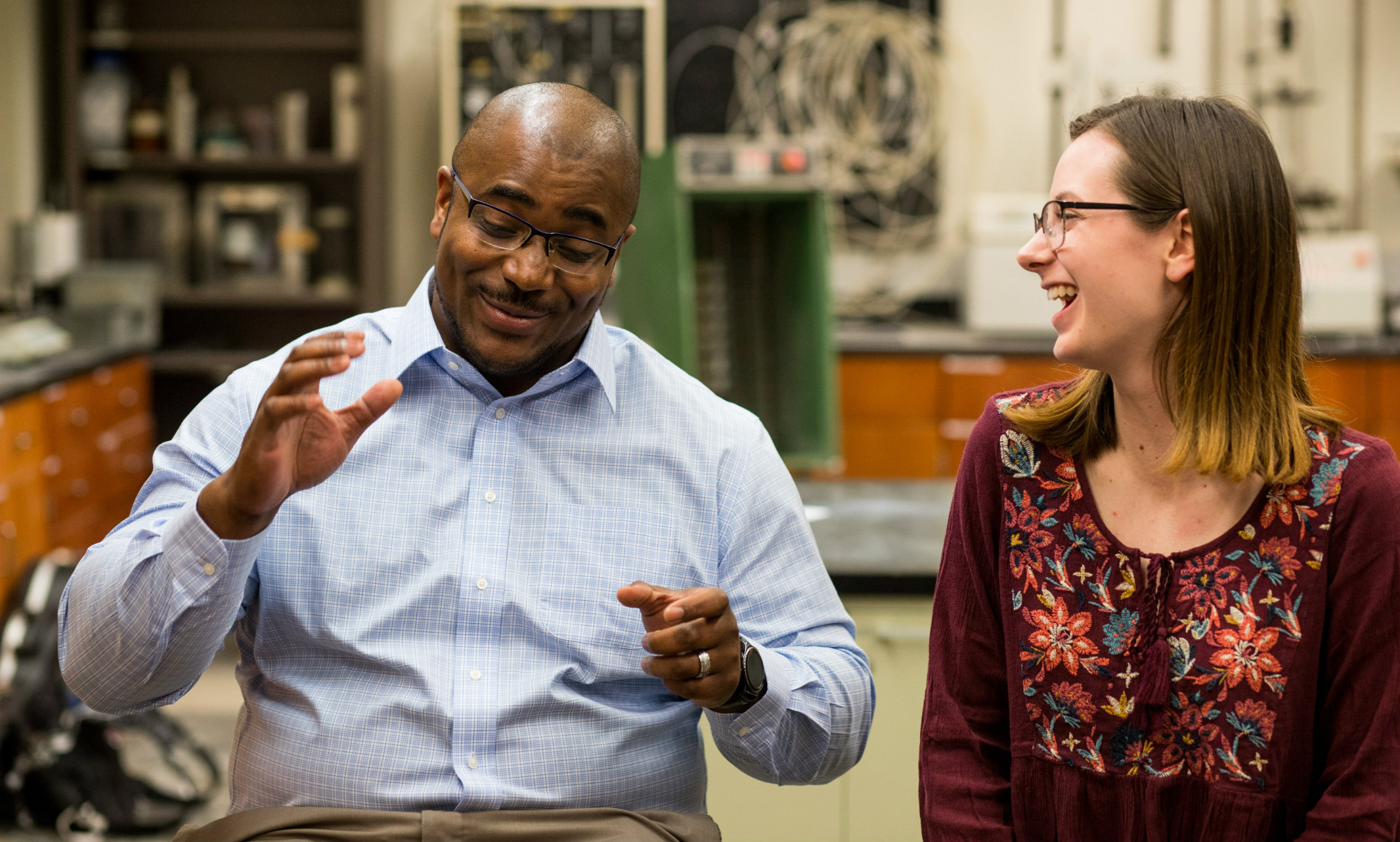
Dynamic duo in the School of Computing and Engineering reflects on service trip to Panama
The heart of UMKC is our campus community. With small class sizes and lots of opportunities, it’s easy to develop student mentorship teams. And these rich relationships—our Dynamic Duos—are some of our best success stories.
Jewel Janke, a senior civil engineering student and president of the UMKC chapter of Engineers Without Borders, arrives at the engineering lab before George White Jr. (B.S.C.E. '13), mentor for Engineers without Borders. She mentions she hasn’t seen White since their trip to the Panama province of Coclé in January, but when he enters so does a familiar vibe that comes from traveling nearly 11,000 miles together.
In previous trips, Engineers Without Borders designed and implemented a system that delivers water from the source (a natural spring) to the village’s center. This year’s trip was to assess the best route to build a line off the existing system that would allow 10 more families (approximately 75 people) access to water year-round. During the three-to-four months that make up the dry season, those villagers hike, almost daily, to the source and carry as much water back as they can.
“The stress that hiking miles for water puts on a family. That’s the pressure point Engineers Without Borders is trying to alleviate.” George White Jr.
Speaking to the challenging nature of that hike White says, “I’m talking mountains, some people think differently, but I’m calling them mountains. It was up and down, up and down. Some rugged terrain.”
Although Janke wouldn’t call them mountains she concedes that it was “really, really hilly.”
“Extremely hilly,” White interjects.
Photo by Brandon Parigo
Since becoming involved with Engineers Without Borders last summer, White, a lead civil/site engineer at Black & Veatch and director-at-large for the School of Computing and Engineering Alumni Association Board, has hit his stride with the group saying, “With data gathered during the last trip, I’ve been able to utilize some of my skills to help the students.” It was a happy coincidence that White has previous experience in plumbing since most of the system is made up of plastic PVC pipes, storage tanks and valves.
His favorite thing about working with the students? "...Seeing their ingenuity in action. For example, working to communicate efficiently with the people we are serving Panama or figuring out the technical details of the design, there is always a problem to solve," White says.
One thing the two happily agree on is the sense of camaraderie that was a hallmark of the trip.
Sharing experiences over dinner each evening with the group was one of White's favorite memories. Janke recalls one special dinner at Maria Nicolasa's house, president of the water committee, that overlooks the jungle in Panama. "We had spent the day surveying the extension. Many of us discovered blisters on our feet when we finally had the opportunity to sit down and take our shoes off. We were in two groups that day so we caught each other up on what we'd been doing and relaxed. It was the perfect end to a long day," Janke remembers.
Right now, students are designing the new branch of the system. Once approved by the national Engineers Without Borders chapter, the next trip will involve trenching and building. Although Janke graduates in May, she looks forward to seeing the project completed in the next several years.
Want to help build the next leg of the water system?
Donate to the project
Apr 26, 2019
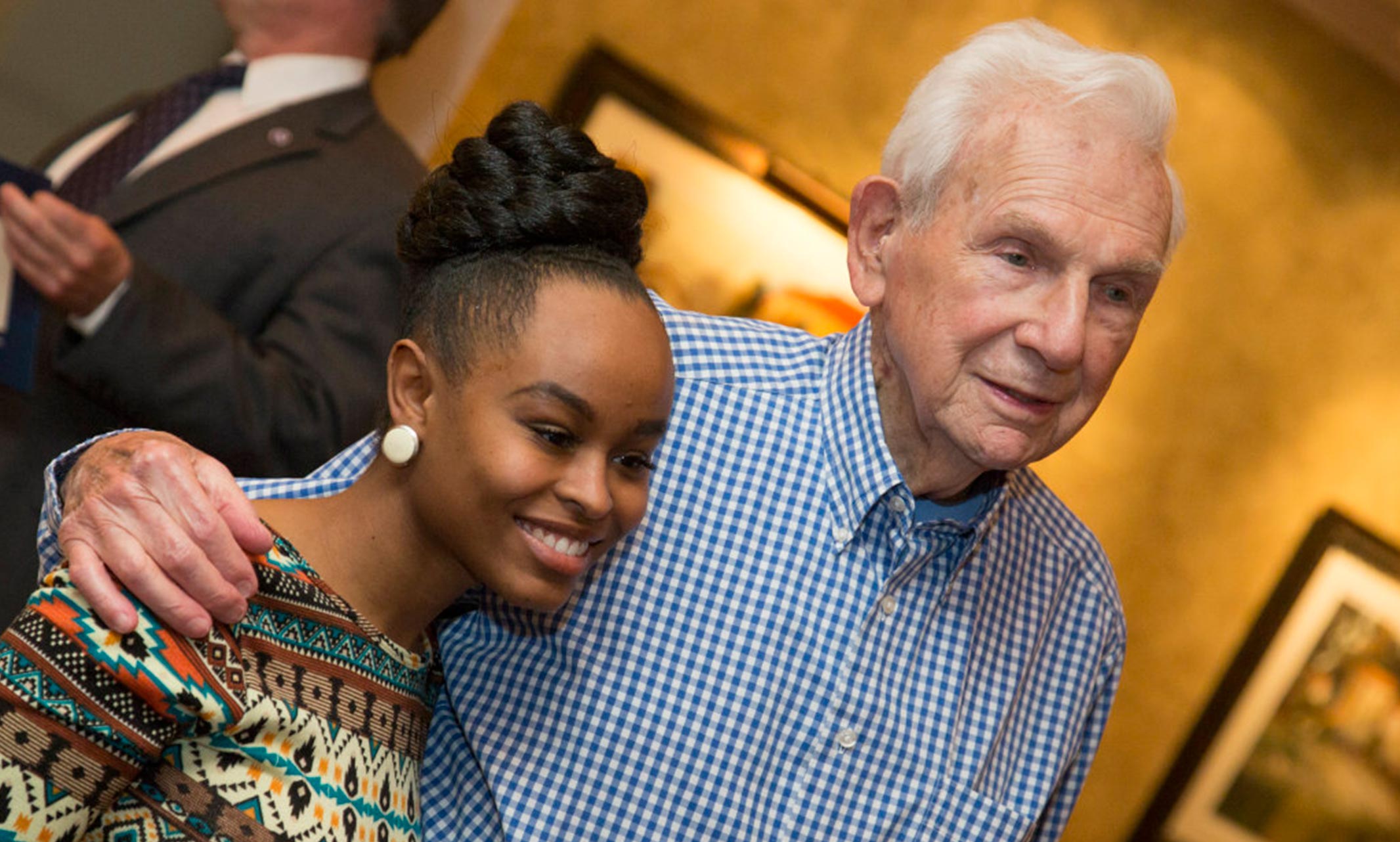
UMKC honors champion and supporter Henry Bloch
The University of Missouri-Kansas City is celebrating the extraordinary life and unprecedented contributions of Kansas City entrepreneur and philanthropist Henry W. Bloch (1922-2019).
Learn more at rememberinghenrybloch.com.
Bloch was the retired chairman of H&R Block, a tax-preparation company which he founded with his brother, Richard, in 1955. A quintessential entrepreneur, Bloch worked tirelessly — toiling over tax returns as his first child, Robert, was being born — and deftly responded to shifts in the market, developing H&R Block into the largest commercial tax preparation firm in the world.
A native Kansas Citian, Bloch was a devoted champion and supporter of the city and the University of Missouri-Kansas City, which he attended when it was the University of Kansas City. He later graduated from the University of Michigan after serving in the U.S. Army Air Corps during World War II.
Bloch enlisted in the Air Corps following Pearl Harbor. A navigator on B-17s, Bloch flew 32 combat missions, primarily over Germany, including three missions on D-Day.
He noted in the book about his service, “Navigating a Life: Henry Bloch in World War II” by John Herron, associate dean of the UMKC College of Arts and Sciences, that “despite the outlook for the Allied forces, he remained optimistic and never wavered about his ability to have an impact on the conflict.”
“I never knew what the next day would bring, but I figured I had a job to do and I would give it my all,” Bloch said.
He was awarded the Air Medal with three oak leaf clusters for his wartime service.
Henry Bloch saluted the work of faculty, staff and students at the celebration of the Bloch School of Management rebranding celebration. Henry Bloch was joined by his son, Tom Bloch; Brian Klaas, dean of the Bloch School of Management; and UMKC Chancellor Mauli Agrawal.
Henry’s son, Tom Bloch, is the author of “Many Happy Returns: the Story of Henry Bloch, America’s Tax Man.” Tom Bloch is a UMKC trustee and chairman of the board of the UMKC Foundation. He recognized his father’s commitment to Kansas City and the university.
“As soon as he was successful, he started giving back,” said Tom. His father was committed to supporting the city that had supported him and his brother since the birth of their business.
“I have a debt to the people of Kansas City,” Henry Bloch said. “Everything I have — I’d have nothing without the people of Kansas City. That’s my biggest thing I like to do — help people in Kansas City.”
“Henry Bloch has inspired me to become an innovator — someone who looks for how to make the world a better place through business. He inspires me to become someone who makes a difference and gives back, so others can not only do the same, but better.” - Daphne Posadas, business major
A stalwart of UMKC and its students, Henry Bloch, at right, a former trustee of the university, received eight significant honors and awards from the university. He was a regular and enthusiastic participant in the events that celebrated faculty, staff and students including UMKC Commencement, where he is shown with his son, Tom Bloch, and Tom Bloch’s wife, Mary Bloch.
Henry Bloch, a former trustee of UMKC, is the largest donor in the university’s history. He endowed the Henry W. Bloch School of Business in 1986, and provided the funds to build a state-of-the-art building that would encourage collaboration, interaction and the spirit of vibrant business and entrepreneurship. The Bloch School is one of three legacy organizations of the Marion and Henry Bloch Family Foundation along with the Nelson-Atkins Museum of Art and Saint Luke’s Hospital of Kansas City.
Focused on advancing educational opportunities for a broad range of students, Bloch committed $50 million to support scholarships to UMKC alone. His latest gift targeted promising students from urban neighborhoods who are shut out from other school opportunities.
Chancellor Mauli Agrawal celebrated Bloch’s contributions to UMKC and the students who will flourish with his help.
“I do know that my career will be focused on giving back to this community. That is the example that the Bloch family has set, through this program, and so many other acts of generosity. That example made my journey possible, and it inspires me.” - Brian Ramirez, Bloch Scholar, health sciences major
Henry Bloch, in conversation with his son, Tom Bloch, at the Bloch School of Management.
“In Tom Bloch’s book, he quotes Henry describing what Henry called the culture of “and then some.”
‘The person who succeeds is the one who does his or her own job, and then some; who is thoughtful to others, and then some; who meets obligations and responsibilities, and then some. That’s the person who steps ahead of the crowd and goes on to great heights.’”
Henry Bloch’s legacy will be a reflection of his dedication to the people he loved and the organizations to which he was committed.
Henry Bloch saluted the work of faculty, staff and students at the celebration of the Bloch School of Management rebranding celebration.
In a collection of birthday wishes on the occasion of Bloch’s 90th birthday, several friends and colleagues quoted Ralph Waldo Emerson, “An institution is the lengthened shadow of one man.” Bloch cast his shadow on many Kansas City institutions. UMKC is fortunate to have received the benefit of his wisdom, spirit, dedication and support. We are proud to carry the mantle of his legacy, which will continue to inspire our current and future students.
Honoring Bloch
Henry W. Bloch dedicated his spirit, energy and time to the work of UMKC. The university awarded him eight times during his years with us.
Chancellor’s Medal Award, 1980
Entrepreneur of the Year (with Richard Bloch), 1986
Presidential Citation of Service, 1992
Top 100 Innovators and Benefactors, Perspectives Magazine, 2000
Entrepreneur of the Year, 2005
Legacy Award, 2007
UMKC Foundation Award of Distinction, 2013
Bloch Hall of Fame, 2014
Read more about Henry Bloch’s legacy from H&R Block and the Marion and Henry Bloch Family Foundation.
Apr 23, 2019
Open to the public including students, faculty and staff
The University of Missouri-Kansas City School of Law has opened a Self-Help Law Clinic at the Leon E. Bloch Law Library in the School of Law building, 500 E. 52nd St. The clinic is open to members of the public — including university students, faculty and staff — to provide legal information and advice, limited scope legal representation and referral for a range of civil matters.
The clinic is operating in cooperation with Legal Aid of Western Missouri. Some issues that the clinic attorneys address include helping clients change their names, secure title to their cars, pursue small-claims actions in consumer matters, understand rights and obligations as tenants, or address simple family law matters. Though some matters may require clients to pay court costs or filing fees, the clinic attorneys provide their assistance free of charge.
The clinic cannot assist people — beyond providing referral — in matters in which they would be in conflict with the university, the UMKC Trustees or any member of the UMKC community (faculty, staff or students). Visit the Self Help Clinic’s website for more information on connecting with a Missouri licensed attorney.
Apr 22, 2019
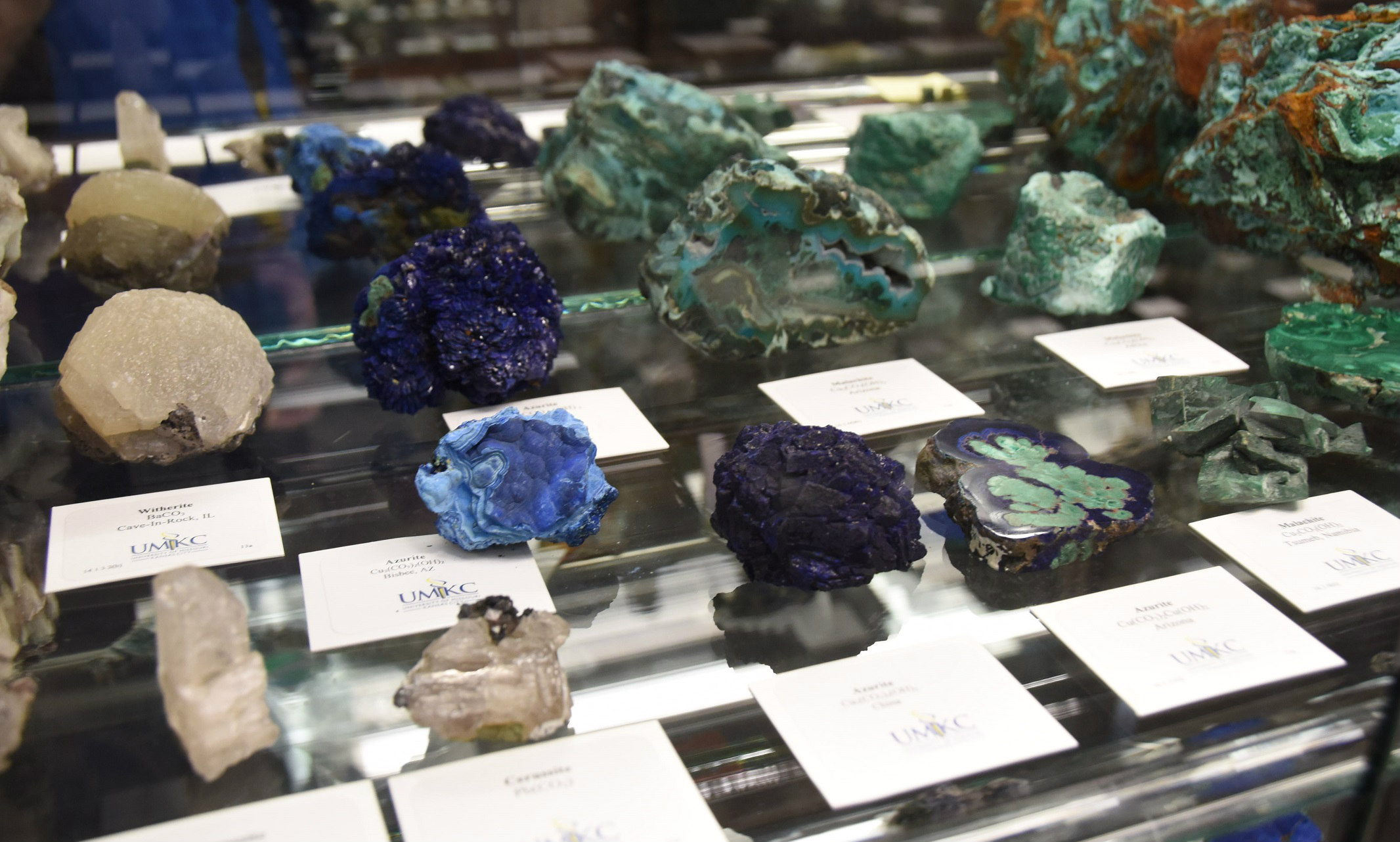
Crinoids – or “starfish on a stick” – are local standouts of collection
The heart of downtown is now home to lofts, shops and stylish watering holes, but 10th and Grand was once a shallow sea. Excavators uncovered at least 400 crinoid specimens – or “starfish on a stick” – there in 1889. These ancient creatures, part of the numerous minerals and fossil specimens that make up the collection of the Richard L. Sutton, Jr. Geosciences Museum, have found a new home in Miller Nichols Library.
The new museum space creates a better experience for both casual visitors and serious enthusiasts. Located across from the LaBudde Special Collections on the third floor of the library, the exhibition space is larger than its former location and will be open regular library hours. Glass walls allow viewing of specimens even when the museum is closed. Upgraded LED lighting provides a better experience while saving energy.
Several new fossils and minerals have been added to the exhibit.
“We are very proud to welcome Chewy, the new juvenile mammoth fossil we have acquired with grant funding from the Kemper Foundation,” says Megan Medley, an assistant in the Department of Geosciences. “We had Chewy’s lower jaw with three teeth, scapula, pelvis, femur, ribs and vertebra over at Union Station as part of the Dinosaurs Revisited exhibit during its duration. We are very happy that Chewy will be coming to UMKC.”
The museum opened in 1973, when Richard L. Sutton and UMKC Professor Eldon J. Parizek assembled much of the collection and display units. Sutton, a dermatologist, was an adjunct geology instructor who donated his personal collection of cephalopods — squid-like ocean dwellers — and fluid inclusions, which are rocks containing liquids, to the museum. Visitors will be able to tip a specimen of clear quartz and watch the trapped, primordial liquid move.
Join the staff of the Richard L. Sutton Jr. Geosciences Museum for its grand re-opening noon to 2 p.m. April 26.
The Geosciences Museum’s regular hours are Monday to Friday, 7:30 a.m. to 11 p.m., Saturday 11 a.m. to 6 p.m. and Sunday 1 to 11 p.m. with exceptions.
Private educational tours with Richard Gentile or Jim Murowchick can be scheduled through the Geosciences department by calling 816-235-1334.
Apr 22, 2019
College AD covered the work UMKC is doing to provide support for student-athletes and prepare them for life after graduation
“We are fortunate, in Kansas City, to have a such a diverse and professional landscape. We have entrepreneurs, big companies, so we wanted to capitalize on our great city and connect them with our student-athletes.” – Ursula Gurney, UMKC Deputy Director of Athletics and Senior Woman Administrator. Read more
Apr 22, 2019
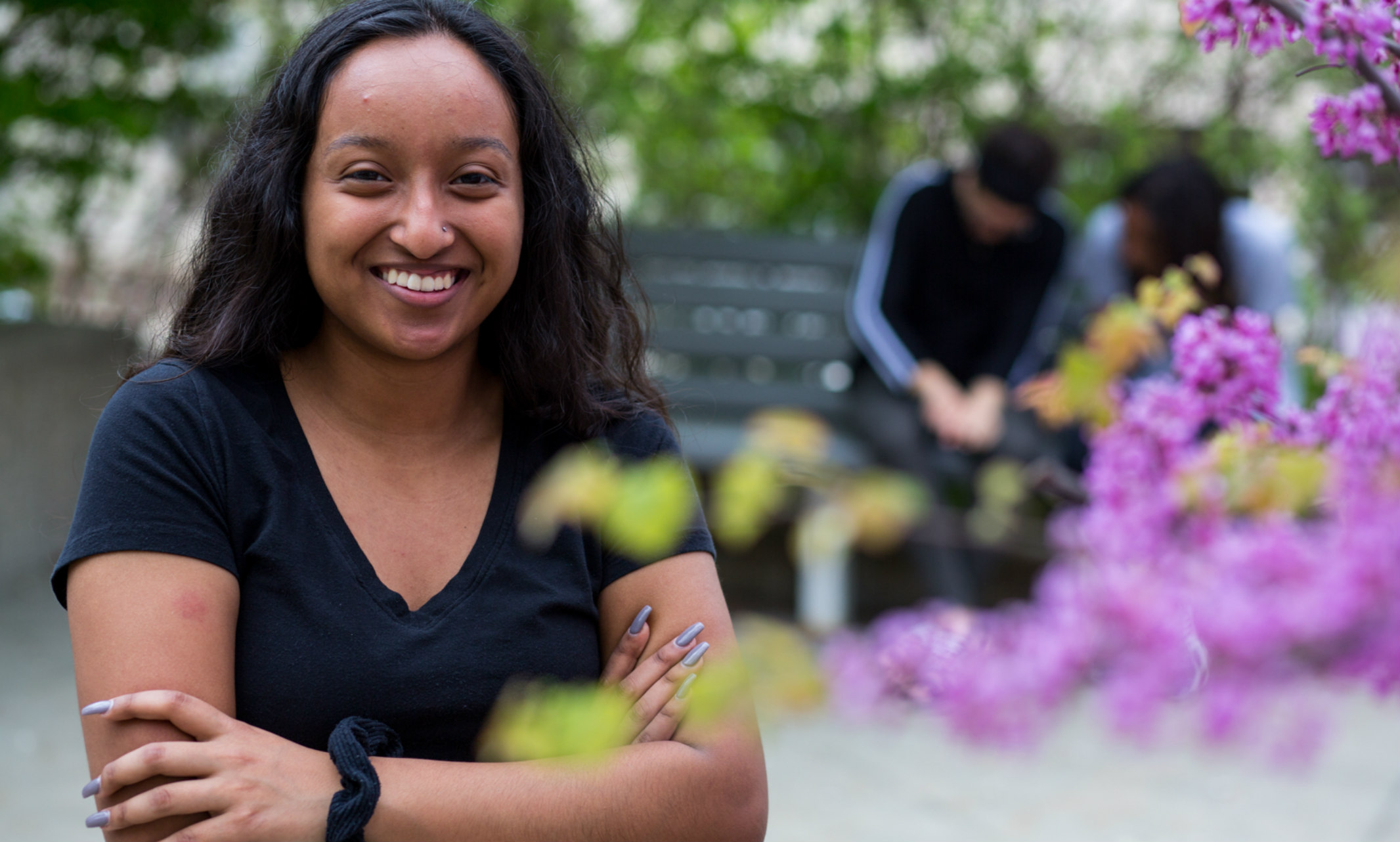
Jennifer Rangel talks about how University College and a KC Scholars scholarship is helping her discover a career path
Get to know our people and you’ll know what UMKC is all about.
Jennifer Rangel, '22
Hometown: Kansas City High School: Shawnee Mission East High School UMKC degree program: Undecided, University College
Why did you choose UMKC?
I chose UMKC because I wanted the diversity. I had attended a predominately white high school and I wanted to have the opportunity to meet other individuals with various backgrounds. I also wanted to be around others who shared the same ethnicity and heritage as me. I’m Hispanic.
Do you have any scholarships? What do they mean to you?
I have been a recipient of a few scholarships and am extremely grateful for the awards that have been given to me. However, there is a scholarship that means the most to me: I am a part of the first class of students to ever receive a KC Scholars scholarship. It has definitely changed my life and really granted me the opportunity to attend school. It has opened doors for me and took the stress of affordability off my shoulders. I have been able to network with a variety of other individuals through this organization and be a part of a few KC Scholars projects to help spread the word about the amazing opportunities they offer for many groups of people.
Why did you choose your field of study?
I am currently a student of University College (UCollege) with an undeclared major. However, I have been looking into pursuing business marketing as it is something that I think would be a great fit for me and my interests. I enjoy graphic design and the creativity that comes along with it and while I have thought about studying graphic design in the art school, through UCollege, I have been able to learn more about myself to realize and understand that going the business route with design is something that I would be more interested in.
What are the challenges and benefits of UCollege?
UCollege definitely helps you take the time to learn more about yourself and use that information to determine the best fit for your future career. You might uncover information about yourself that you may not agree with or is hard to come to terms with, but it is part of the growing process.
The biggest benefit of being in the UCollege progam is that you can take the time and really decide what you want to do with your life and where you want to see yourself in your future career. It prevents you from choosing a major that you may still be unsure of and allows you to really think about what you enjoy doing. This program allows you to take your interests, your dislikes, your learning style and many other things into account when you are thinking about your career.
Since entering college, what have you learned about yourself?
I have learned that I do not need to have a set plan for my life. I came into the fall semester of freshman year planning on majoring in computer science, something that I had never done before. I assumed that it would be something I would enjoy because I like technology and I like working with computers. I later learned that it was something I actually really disliked, and I realized that I solely chose that major because I was scared to go into a university undecided.
I had grown up always following a plan and having set paths that I planned on taking to be successful, so when my life was not going according to plan, I was scared. I did not like the idea of the unknown, not knowing what I was going to major in or do with my life. I did not like the feeling of being unprepared or not knowing what to expect. However, I have been able to use this experience in pushing myself to let go and not try to control everything, to see where life takes me and live by the phrase “what happens, happens.”
Are you a first-generation college student? If so, what does that mean to you?
Yes, and it means everything to me. It tells me that all my hard work in school throughout the years has paid off. I grew up being told by my family that I had so much potential and I was so smart. I knew that college was a must for me; I wanted to do something with my life and I knew that nothing was going to stop me from making this happen.
I am doing this alone, I did not have my parents to help prepare me for college, or to help me understand what to expect. I was determined and motivated and that was all I needed to push through. I am happy that I am going to be the first person in my family to get a degree. I am going to make my family proud, I am going to be an inspiration and an example for other first-generation students. It is not easy and there is a lot of pressure, but I am determined to be a part of the group of first-generation students that are changing the statistics and data set against us.
Who do you admire most at UMKC and why?
I admire my pre-calculus professor, Kristin Kathman. She always sees the potential in her students and encourages the best work from each one. She loves joking around, which makes the class extremely enjoyable. My professor genuinely cares about the work that she is doing and it’s obvious. She refuses to let any one of her students struggle or fail her class. She knows what we are capable of and does what she can to help each of us individually. She has set a high standard for future professors, and it has allowed many of her students to create that academic relationship with her. She is definitely a professor that I will always admire and someone that I know I can always go to for anything.
What extracurricular activities are you involved in at UMKC?
I am a current executive board member for the National Society of Leadership and Success. I am the society events chair; my main job is to book rooms and ensure the events held for our members run smoothly. I get to work closely with a group of other students and I get to be part of a great organization.
What is one word that best describes you and why?
Determined. I am determined to accomplish a variety of things in regard to my academics, to meet new people and make new friendships, and I am determined to make the most that I can out of my time here at UMKC.
Apr 19, 2019
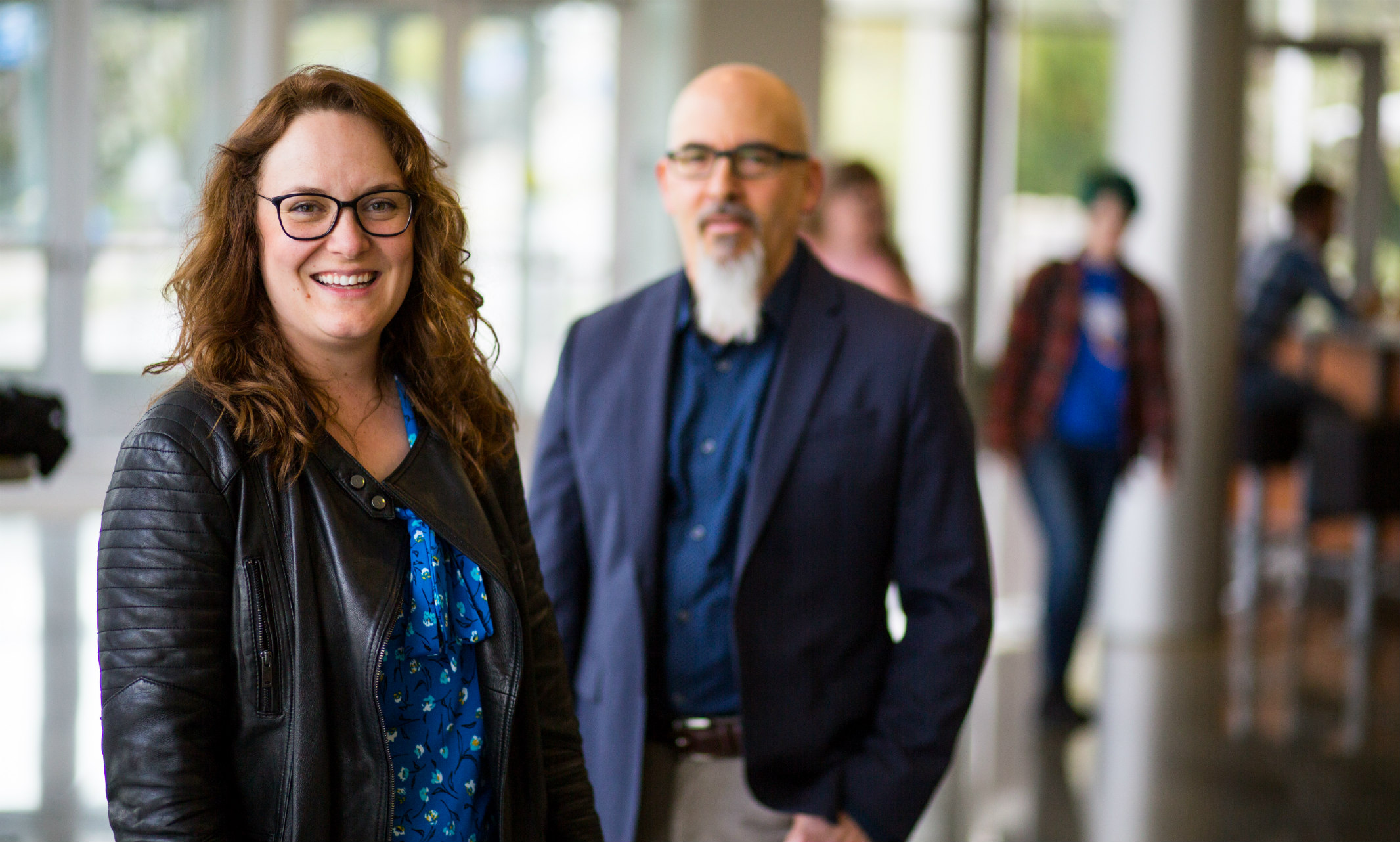
Chelsea Dahlstrom Recognized for Research and Creative Works Staff Award
During her graduate program at UMKC, Chelsea Dahlstrom, senior business operations associate for the Office of Research Services and recipient of the Excellence in Research and Creative Works Staff Award, had a taste of assisting with research on faculty projects and was able to see into that world.
“When I interviewed for this job, I was interested in continuing to serve UMKC’s research interests but on a much broader scale,” she says.
Dahlstrom has worked with faculty principal and co-principal investigators on more than 25 grant applications, including some of the largest that UMKC has received in its history. Throughout this process, Dahlstrom has taken an active role in supporting the application process and helping faculty research staff successfully navigate the grant systems.
“We consider Chelsea a go-to resource for determining what the fine print means for any of our proposals,” says Jacob Marszalek, associate professor of statistics and nominator. “Even if UMKC is not the lead, Chelsea calls upon her experience and know-how to provide information and advice when navigating the process.”
“Her co-workers see her has a rising star. Chelsea is cultivating a culture of excellence with both faculty and staff “During the last year she has shown real leadership and collaborative spirit in helping to raise funds for a campus-wide STEM+M ecosystem initiative.”- Anthony Caruso, associate vice chancellor of research and physics and engineering professor
Dahlstrom sites her natural curiosity as a key component in her success on these projects.
“I love learning about the projects,” she says. “Since my role involves a lot of paperwork and bureaucracy, it would be easy to feel detached, overwhelmed or uninspired, but I find that when I focus on the actual work that’s happening, the discoveries being made, the people being served and helped by these projects, that’s when I’m able to be the most effective in my role. There’s always something interesting and exciting in every single project, and focusing on that makes all the work much easier.”
Anthony Caruso, associate vice chancellor of research and physics and engineering professor, and Daniel McIntosh, astronomy professor, who are both involved in some of UMKC’s largest grant requests related to Science, Technology, Engineering, Mathematics + Medicine (STEM+M), noted Dalhstrom’s enthusiasm and professionalism in their combined recommendation.
“Her co-workers see her has a rising star. Chelsea is cultivating a culture of excellence with both faculty and staff “During the last year she has shown real leadership and collaborative spirit in helping to raise funds for a campus-wide STEM+M ecosystem initiative.”
Dahlstrom says the best part of her job is witnessing and supporting all of the amazing work happening across both campuses in everything from the medical sciences to the humanities to community outreach. Dahlstrom was overwhelmed that her co-workers nominated her for the award.
“It was such an amazing and generous thing to do,” she says. “Everyone at Office of Research Services is wonderful and we love getting to support the faculty and staff everyday on the important work here at UMKC.”
Apr 18, 2019
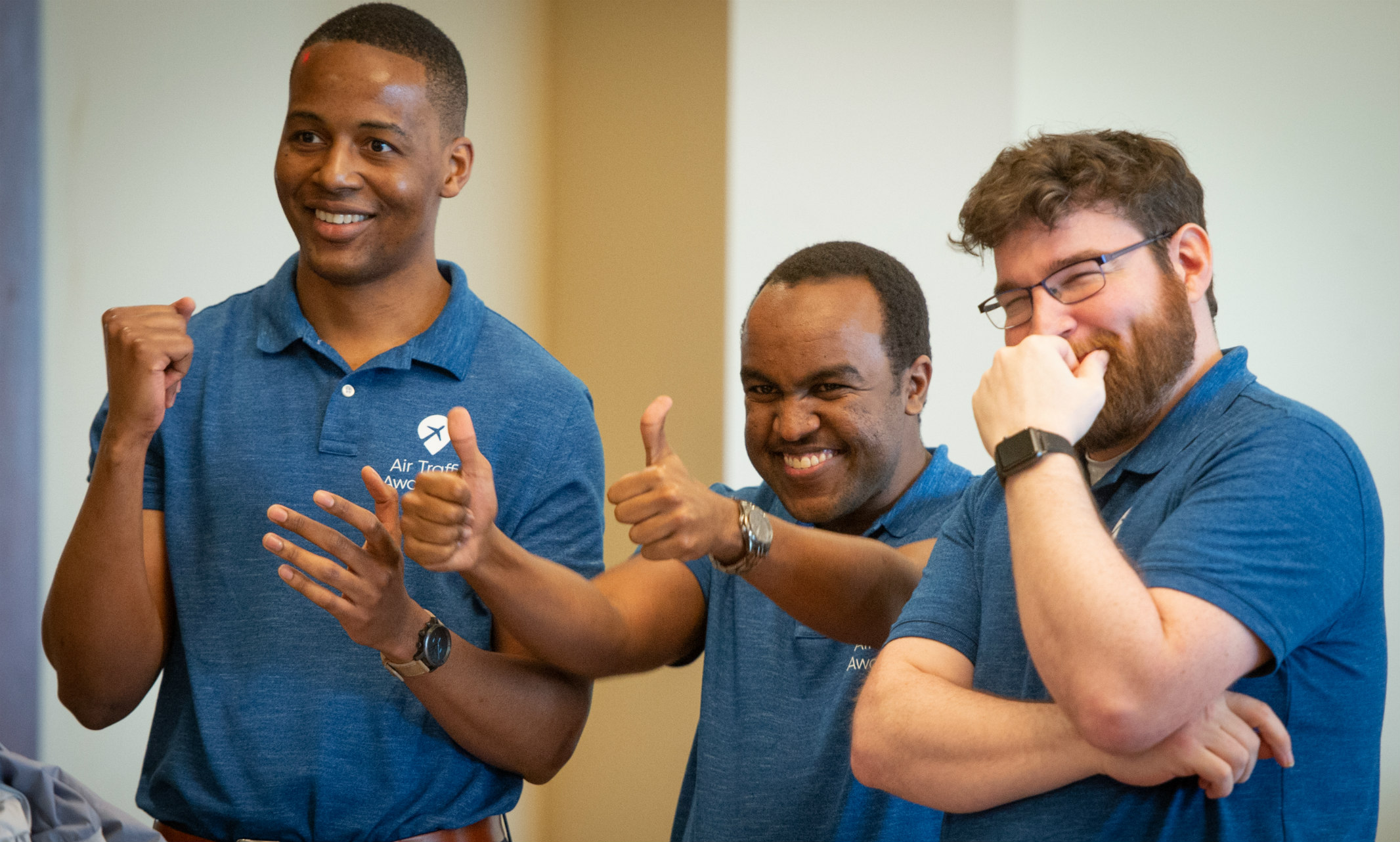
Placing second gives Air Traffic Awareness a boost
University of Missouri-Kansas City students Tonderai Kamabarami, Merwan Abdelmajeed and Cameron Knight placed second in the UM System Entrepreneur Quest Pitch Competition April 5. Placing second in the pitch competition also gave the project, Air Traffic Awareness, a $10,000 boost.
“This award means a lot to us, we were very excited to come in second, especially considering all the talented teams we were up against,” Kamabarami said. “It really was an honor to be recognized. We had built our first hardware prototype before the competition, so we really want to continue investing money into future prototypes as well as testing.”
Air Traffic Awareness is dedicated to providing portable solutions to improving aircraft safety for pilots utilizing the newest available technology. Taking advantage of cutting-edge radio technology available in all aircraft, the team has developed a custom-built mobile device and an application to detect potential aircraft collisions in real-time without the need for GPS or internet connections.
Team members are all professional software developers with more than 15 years of professional experience combined, and have a long-standing passion and dedication to the aircraft industry. One of the founders is a pilot who steered the team toward this project.
“There is no ‘how to’ guide to a start-up, so seeing all these talented teams at different stages of their company has really been eye opening, and by far the most helpful thing I have personally gained from this competition."-Tonderai Kamabarami
“We are dead set on improving the safety of personal and private pilots with our Air Traffic Awareness solutions,” Kamabarami said. “Our goal is to revolutionize the information available to pilots through portable devices and applications, by using the new required radio technology, improving safety and allowing the pilot to make smarter decisions in flight.”
Kamabarami said they first participated in a UMKC competition on March 3 where they placed third and received $5,000. The team also participated in the EQ Student Accelerator Program that was offered to them after the first round of the UMKC competition. The accelerator class was also open to students outside of the competition if they elected to take it. The final step was the UM System EQ Pitch Competition April 5.
Participating in the UM System program provided the team with numerous resources, ranging from mentors to faculty. Kamabarami said they also learned from watching other ventures pitch. Doing so helped them refine their message.
“There is no ‘how to’ guide to a start-up, so seeing all these talented teams at different stages of their company has really been eye opening, and by far the most helpful thing I have personally gained from this competition,” Kamabarami said.
Air Traffic Awareness was one of 12 teams, three from UMKC, that competed in the final day of the UM System EQ Pitch Competition. The other UMKC teams were DeepLens and Family Partner Solutions.
The UM System EQ competition was the first pitch type competition Kamabarami and his team have participated in while students at UMKC. But they plan to do more, including the Regnier Venture Creation Challenge on May 2.
“We can’t say no to another opportunity to gain exposure and potential capital!”
Apr 18, 2019
Chapter continues its national winning streak
UMKC School of Pharmacy students landed a number of top awards and were named among the nation’s top American Pharmacists Association-Academy of Student Pharmacists chapter at the APhA national convention this spring in Seattle.
The UMKC chapter of the APhA-ASP received a 1st Runner Up in Chapter Achievement — top 7 in the U.S. — out of more than 100 for National Chapter Achievement Award winners 2017-18. Last year and in 2012, the chapter won No. 1.
UMKC also won top individual honors and chapter awards. The UMKC School of Pharmacy chapter includes students and faculty sponsors from all three of its Missouri campuses: in Kansas City, Columbia and Springfield.
Jordyn Williams, a third-year pharmacy student at the UMKC School of Pharmacy in Columbia, captured first place in the APhA-ASP National Patient Counseling Competition. Her national championship in the competition was a first for a UMKC pharmacy student.
Emily Oliver, a third-year pharmacy student at the UMKC School of Pharmacy in Columbia, was honored for her chapter leadership with one of four national APhA-ASP Leadership Awards.
In addition, the UMKC School of Pharmacy received the nation’s top chapter award for its work with the Generation Rx program. The effort is an educational program to increase public awareness of prescription medication abuse. Chapters engage in efforts to encourage the prevention of abusing prescription medications.
The chapter placed second in the nation for its efforts with the Operation Diabetes program. The initiative helps identify individuals within the community with previously undiagnosed diabetes and those at risk of the disease. It placed third in the nation with its Over-the-Counter Medicine Safety program to educate 5th and 6th grade students and their families about the safe use and storage of over-the-counter medicines.
Faculty sponsors of the chapter are Cameron Lindsey, Kathryn Holt and Jordan Rowe of the Kansas City campus; Angela Brownfield and Sarah Cox of the Columbia campus; and Lisa Cillessen and Heather Taylor of the Springfield campus.
UMKC Pharmacy Student Victories
2019 APhA-ASP 1st Runner Up in Chapter Achievement (Top 7 in the U.S.)
2018 APhA-ASP Chapter of the Year (No. 1 in the U.S.)
2017 APhA-ASP 1st Runner Up in Chapter Achievement (Top 7 in the U.S.)
2016 APhA-ASP Chapter Achievement Award (Top 4 in the U.S.)
2015 APhA-ASP Chapter Achievement Award (Top 4 in the U.S.)
2014 APhA-ASP 1st Runner Up in Chapter Achievement (Top 7 in the U.S.)
2013 APhA-ASP Chapter Achievement Award (Top 4 in the U.S.)
2012 APhA-ASP Chapter of the Year (No. 1 in the U.S.)
Apr 18, 2019
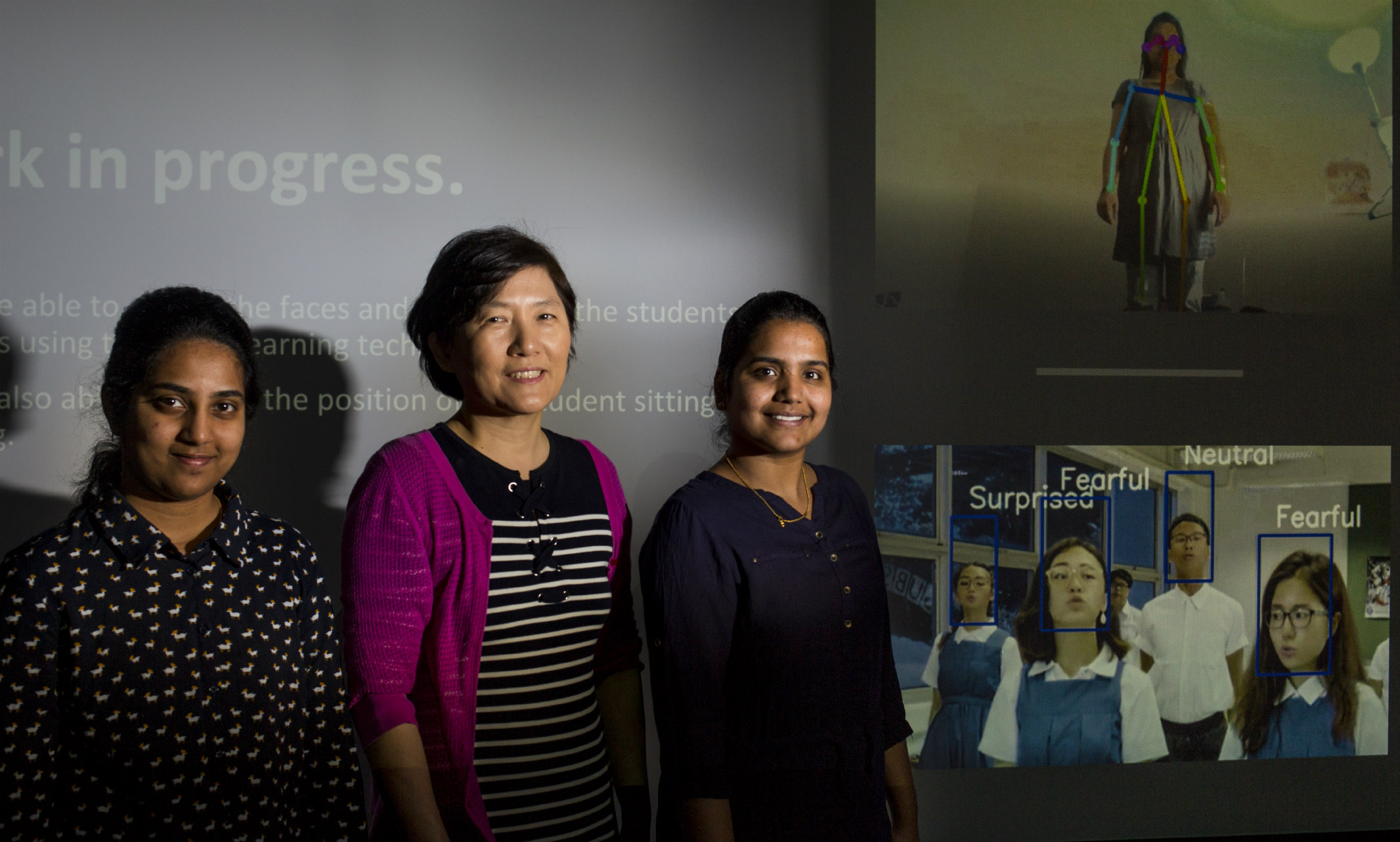
Faculty team uses technology to help instructors visualize how classroom behavior affects student success
A team of faculty from the University of Missouri-Kansas City School of Computing and Engineering, Department of Communication Studies and Office of the Provost and Executive Vice Chancellor have embarked on a mission to leverage artificial intelligence and facial recognition technology to create inclusive environments in classroom settings.
Computer Science Professor Yugyung (Yugi) Lee, Associate Professor of Communication Studies Ye Wang and Associate Research Professor Alexis Petri are working to develop a technology system that will help instructors learn how classroom behaviors translate to student success.
The team of faculty has applied for funding to complete two projects using this technology.
1) Using artificial intelligence to help STEM educators teach challenging subject matter and to monitor growth mindset.
“It’s common for teachers to try and relate to students when teaching subjects like math and science by saying things like ‘it’s okay, I wasn’t good at math either,’ but that actually hinders students’ growth,” says Petri.
2) Launch a strategic initiative for UMKC professors to receive real time feedback on implicit bias.
“We want to recognize that as artificial intelligence learns, we are passing on our bias. Everything implicit to us gets passed on to AI. If we can teach AI to analyze human behavior more reliably than humans, it allows instructors to have a more confidential and genuine assessment,” - Alexis Petri
Using camera equipment to build facial recognition and gesture-recognition technology, the team will be able to monitor classroom settings and further understand the general sentiment of both students and the instructor in real time based on body language, speech and facial expressions.
“We built a Deep Learning model and taught it to detect faces with 8 different emotions (happiness, sadness, fear, anger, surprise, disgust, and neutral). We found that if you have 100 images, 80 of them were accurately labeled with one of these eight emotions by the model while 20 images are not properly labeled. These images may be from your own social network or different people,” said Lee who is working with computer science students to teach the technology to detect these things with 100 percent accuracy. Then, with Wang’s help, the team will be able to teach the technology to analyze the sentiment of every student in a classroom as it relates to content presentation and type without having to identify who the student is.
“Artificial intelligence isn’t about fixing the problem we have with implicit bias, but addressing it. This technology can help us overcome our biases by helping instructors see what’s actually happening in the classroom.” – Yugi Lee
“We want to recognize that as artificial intelligence learns, we are passing on our bias. Everything implicit to us gets passed on to AI. If we can teach AI to analyze human behavior more reliably than humans, it allows instructors to have a more confidential and genuine assessment,” said Petri.
Petri said if this project gets funded, Provost and Executive Vice Chancellor Barbara Bichelmeyer will conduct workshops on growth mindset.
Wang and Lee are working to establish a baseline with the help of the UMKC Theatre Department. Theatre students will get acting experience by role playing various classroom scenarios in a controlled setting to get exaggerated responses. Using camera footage from the classroom, Wang will create an animated report for instructors to visualize how speech and presentation correlate with students’ response.
To get an accurate report, students will be able to complete diversity information before entering the classroom and receive a QR code that will help the technology pay attention to the class’ racial makeup. For the students’ protection, the diversity information they complete will only include racial makeup and gender identity.
“This is a chance for humanities students to gain research experience, and work in labs when they don’t usually get to do so regularly. Collaboration between humanities and sciences is the future of research,”
- Ye Wang
This research will be useful for artificial intelligence research since the project will generate meaningful data for advanced research in artificial intelligence/deep learning. It also gives opportunities to three industries – computer science and technology and social sciences – the ability to understand one another better as there are not often a lot of research collaborations like this.
“Artificial intelligence isn’t about fixing the problem we have with implicit bias, but addressing it. This technology can help us overcome our biases by helping instructors see what’s actually happening in the classroom,” said Lee.
Lee has already began working with computer science students on testing and improving facial- recognition technology with the resources available in the School of Computing and Engineering. They are still waiting to hear the results from the three funding proposals they submitted to move forward with building the cloud application to analyze and translate what’s happening in the classroom.
“This is a chance for humanities students to gain research experience, and work in labs when they don’t usually get to do so regularly. Collaboration between humanities and sciences is the future of research,” said Wang.
Several community organizations are already interested in testing the technology when it is complete.
“In elementary education, it is important to support teachers as they set high standards for students and help students meet those standards. Developing math and science interests and capabilities early is important to broadening and increasing STEM majors in college. When teachers who struggle with math unintentionally give students the message that it is ok not to be good at math, it may have a lasting effect on what students pursue later,” Dr. Angelique Nedved, Director of School Quality, School Smart Kansas City.
Research At UMKC
Apr 17, 2019
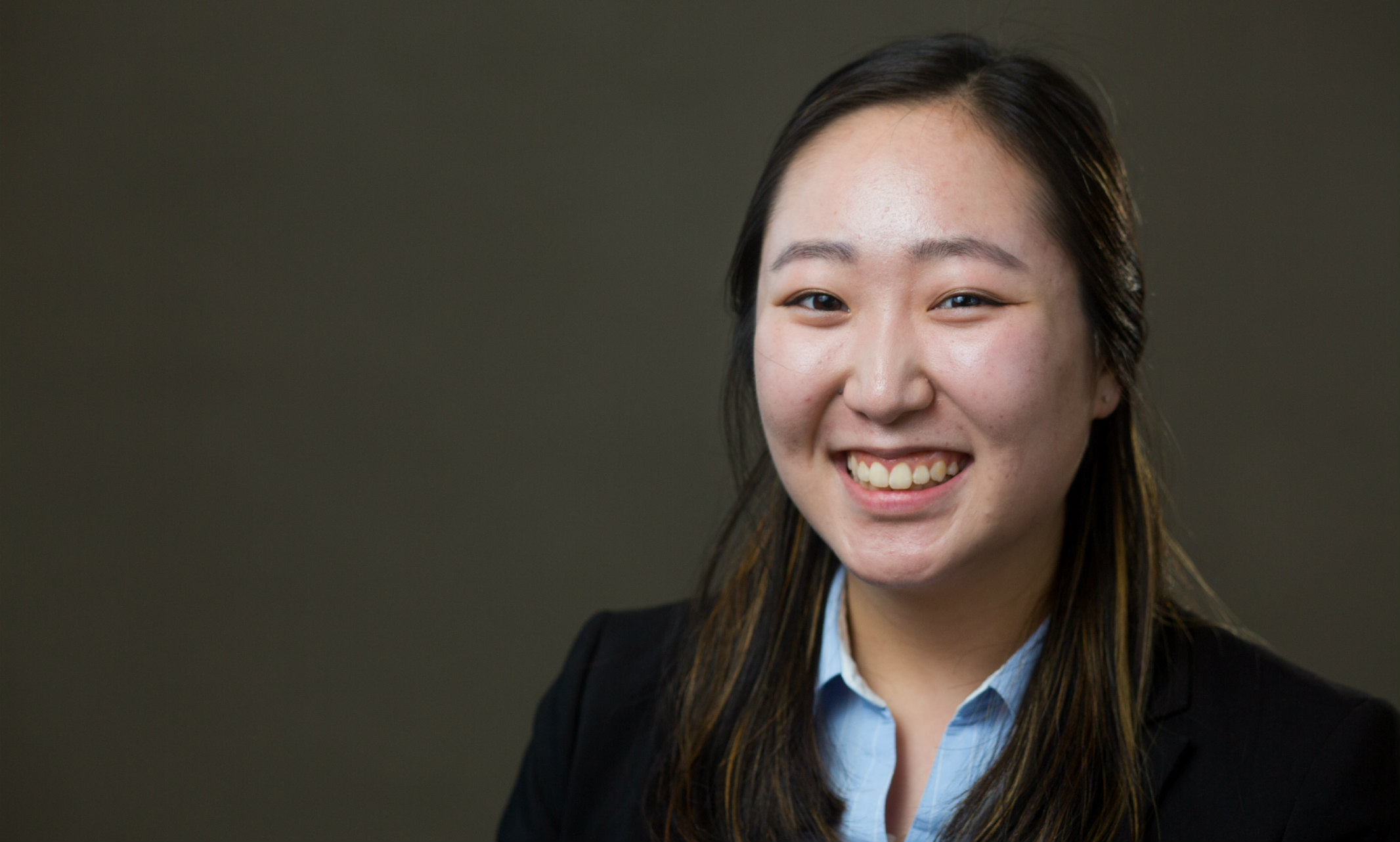
Couple creates legacy in their daughter's honor
When Karen and Don Loeffelholz’s daughter, Kristin, passed away 11 years ago, they made their first contribution to UMKC in her memory.
A few years later in 2001, they established the Kristin Jane Loeffelholz Memorial Scholarship in her name and have been contributing to it since.
The couple feels that providing these scholarships is the kind of lasting legacy that Kristin deserves.
“Kristin loved UMKC,” Don says. “She was her happiest when she was there.”
The Loeffelholzes developed the scholarship criteria based on Kristin’s personal experience. Recipients must be active in engineering activities, either Kansas, Missouri or Iowa residents, employed 20 hours a week and maintaining a C+ average or better.
“Kristin always had a job and worked hard, but she was a C student,” says Karen. “She was sometimes frustrated that there were not more scholarships available for people without a 4.0 G.P.A. We know that there are a lot of students studying hard and working on the side. We wanted to help those people.”
The Loeffelholzes have attended the scholar/donor event in the School of Computing and Engineering almost every year since their first donation.
“It always impresses and inspires us,” says Karen. “Each year it’s different, but we’ve enjoyed every one. There is nothing more wonderful than meeting the students. They are always so polite. It’s a great, happy event.”
After considering different ways to make a gift, the couple felt that a scholarship was the best memorial for Kristin.
“It seemed better than planting a tree or donating a bench. It’s something that will always give back without our having to ask for help for something like a walk,” Karen says.
This year’s recipient is Mina Kim, a senior studying electrical engineering and computing.
“This scholarship has allowed me to be more focused on my school work and involved in engineering activities. I never would have guessed that it would have made so much of an impact on my life.” Mina Kim
Kim is grateful that the Loeffelholzes’ gift has allowed her to take on greater leadership responsibilities and pursue other opportunities.
“I have been able to obtain an internship with a small engineering firm where I’ve been able to apply all that I have learned and contribute to real substations and power plants,” Kim says. “It’s exciting to know that I helped create something that helps others.”
Apr 17, 2019
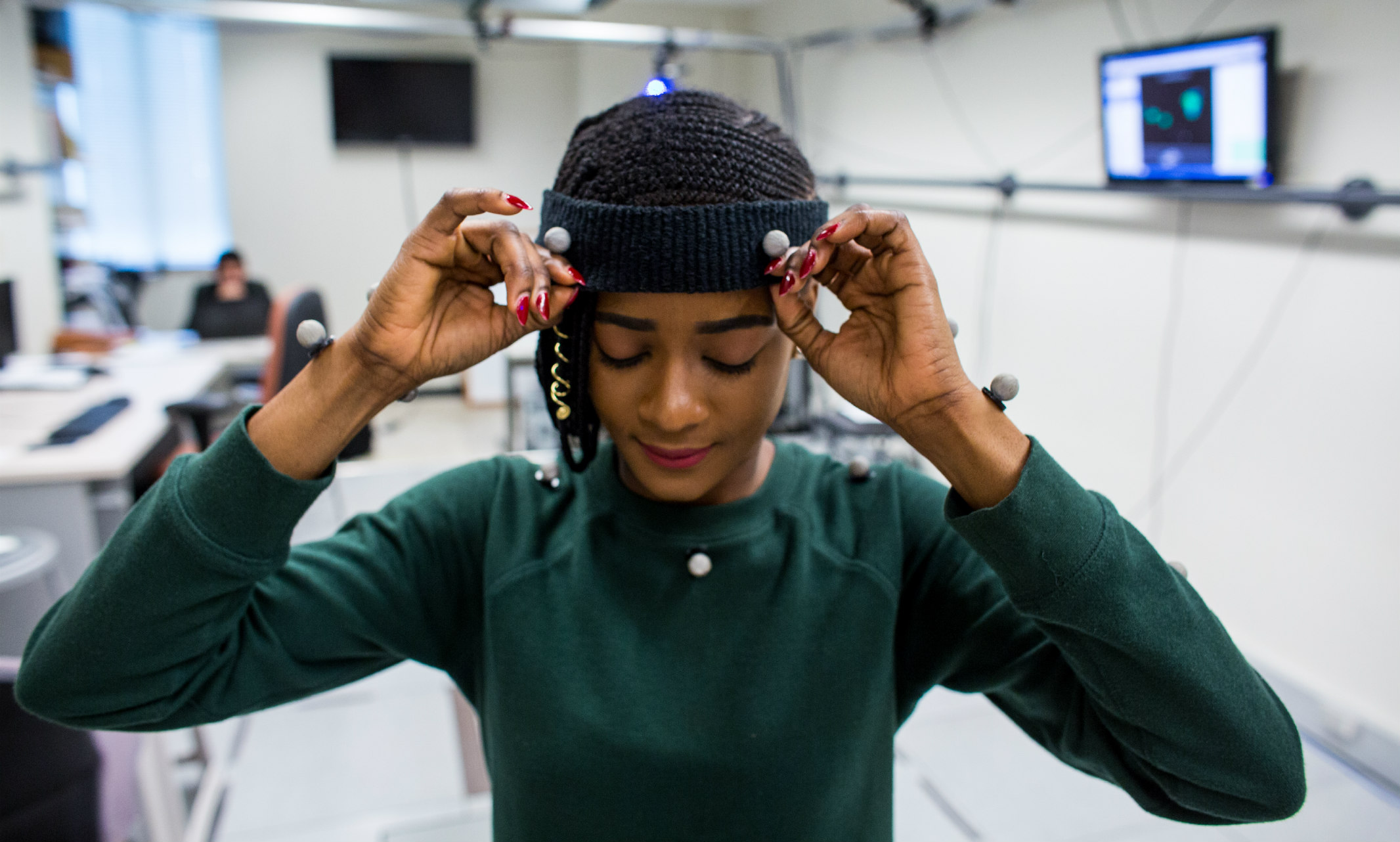
Engineering student found her calling at UMKC
Mary Okafor left Nigeria, where she’d lived her entire life, in 2014 for her college education. Her first experience with America was Kansas City, where her older brother lived at the time. She wants to design medical devices, and spends a lot of time in the engineering school’s motion lab measuring and analyzing crucial data. Watch a video and read a Q & A to learn more.
Mary Okafor, ‘19 Program: Bachelor of Science in Mechanical Engineering, minors in Chemistry and Mathematics School: School of Computing and Engineering Organizations: President of National Society of Black Engineers; African Students’ Association Hometown: Abiriba, Abia State, Nigeria
Why did you choose UMKC?
As an international student, I did not have the opportunity to visit UMKC and get a tour around the school. But my brother lived in Kansas City for a while. He had a friend who graduated from UMKC who made him understand that UMKC was a good school with good programs and professors. It has a good learning environment and is filled with diverse students. This is why I chose UMKC.
Why did you choose engineering?
I have always been fascinated by the way things were being built and how these innovations are used to make the world a better place. I chose to study mechanical engineering because I want to help innovate medical solutions by manufacturing medical devices to improve the health of people.
What are the challenges and benefits of the program?
To succeed in my program, you have to be positively driven and have a goal in life to withstand and pass through the amount of hard work required from you. It is easy to lose focus, but if you know what you want in life, that helps to keep you in check.
The different experiences we get help in shaping students to become better engineers. Being an undergraduate researcher has helped me in knowing how I can help people. Also, you get to connect with people by getting involved in organizations. I joined the National Society of Black Engineers in my freshman year and this also contributed in me staying focused by working with students who have the same mindset as me to be a successful engineer.
How has your college program inspired you?
The thought of how I can use what I have learned in my program and the experience to save lives of people in the future through innovation of medical devices always inspires me to learn more and strive to do better to be the best mechanical engineer I can be.
Since entering college, what have you learned about yourself?
I have learned that stepping out of my comfort zone was really important because it made me become a better version of myself. I became more confident and always open to new try new things that would benefit me in life.
What’s your greatest fear?
My greatest fear is not being successful in life. By not being successful, I mean not being able to use my knowledge to give back to the community to make the world a better place.
What motto do you live by?
“If others can do it, then I can.” That motivates me to always stay positive and be open to learn.
Apr 16, 2019
Chancellor says campuses must welcome wide variety of views
I want to state my unequivocal position that violence and attacks on individuals are unacceptable. I condemn the attack on our speaker by one of our students. That student was arrested and faces several criminal charges. In addition, we suspended the student and the student will not be allowed on campus during UMKC’s investigation, which could lead to a number of sanctions including expulsion.
My original statement may have given an indication that UMKC does not support freedom of expression for all. I apologize if I’ve given that impression, for that was not my intention. It is not the university’s role to take sides, but to rise to the higher principle of promoting a respectful exchange of ideas for our students to form their own views and engage in critical thinking. And we’ll continue to promote diversity of background, experiences and perspectives, which is critically important to creating a vibrant university to advance student success, breakthrough research and meaningful engagement.
In this case, UMKC provided the speaker a venue, as well as police protection to allow him to exercise his rights. We are very disappointed that some students’ actions overtook the respectful behavior of the majority of students who participated in campus events that night. I want to reiterate that we do not tolerate the disruption of peaceful activities or violence of any sort and, as demonstrated by our police, we will take swift action when anyone interferes with the rights of others, including the right of free speech.
These are the foundation of free speech that our democracy depends upon and it must be respected every day on our campus.
Mauli Agrawal, Ph.D.ChancellorUniversity of Missouri-Kansas City
Apr 15, 2019
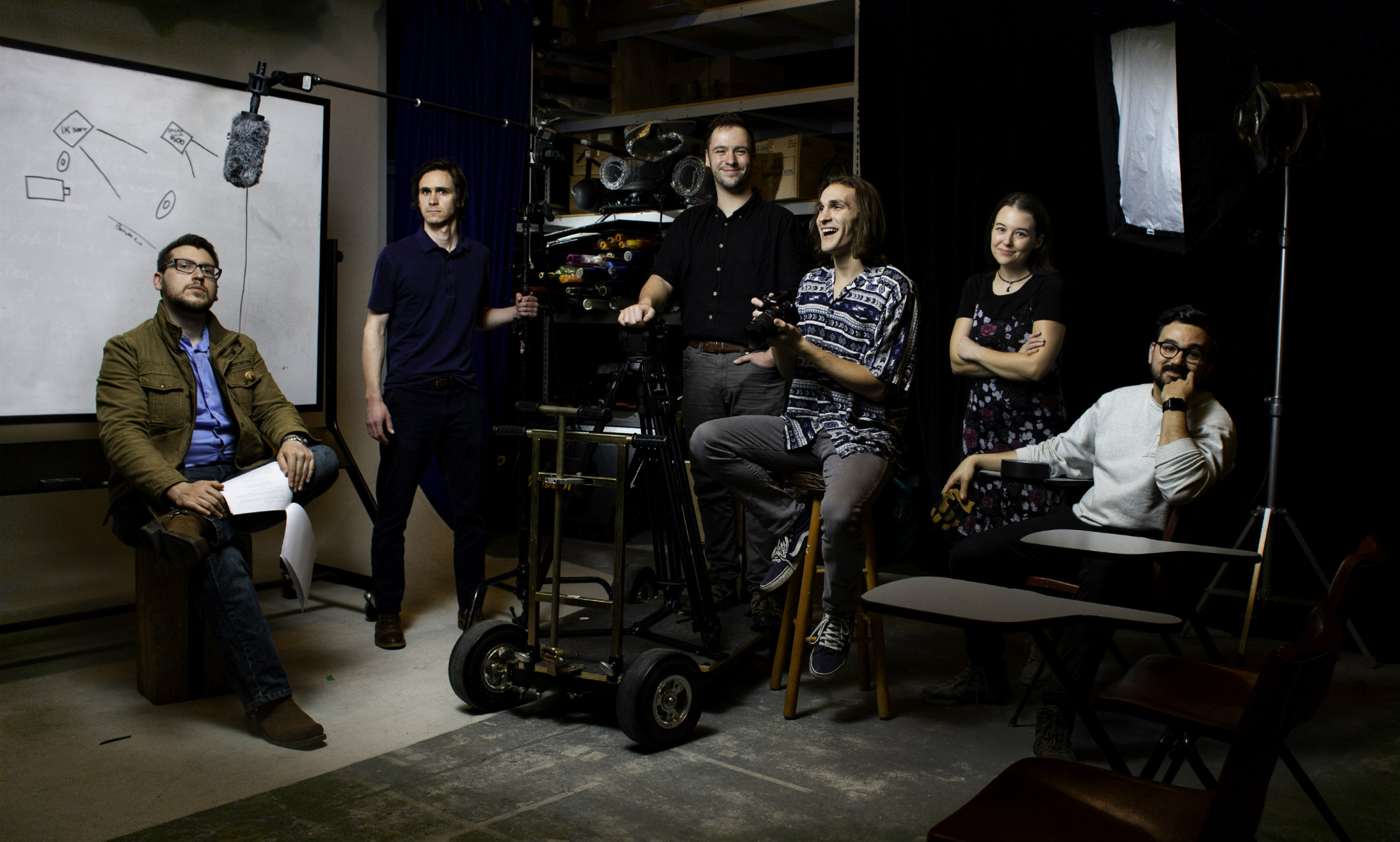
Each got their start in the Communication Studies Department
A bevy of current and former Communication Studies students had work shown during the 23rd Kansas City FilmFest International.
From harnessing a magical, albeit useless, superpower to a night in the life of a call-girl driver, the films and their writers, directors and stars showcase a breadth of creativity and skill.
We spoke with some of the FilmFest participants about their experiences working on films and their upcoming projects.
Andreina Byrne, a 2013 grad, produced and starred in Crude Oil. The film follows Jenny (played by Byrne) as she breaks free from a toxic friendship and learns to control her benign superpower. The film was also screened at the Sundance Film Festival where it was nominated for the Short Film Grand Jury Prize. Byrne says she was overjoyed to have audiences relate to the film saying, “we’ve all had a person in our lives that makes us feel a little nutso at times.”
Andreina Byrne, producer and star of Crude Oil
Sweetheart was co-written by senior Jackson Montemayor and 2018 graduate Cory Cullen, and takes aim at the seemingly innocuous pet names (a.k.a. catcalls) that women endure on a daily basis. Montemayor, who also directed, recalls initial hesitation about two men telling the story from a woman’s perspective saying, “we have no clue what it is like to be in the shoes of a woman, so we knew we needed to do our research to get it right.” Cullen, who also served as cinematographer, says he hopes men watching the film “realize that even though they meant no ill-will, at a point it’s all kind of the same dismissiveness.”
Senior Alex Harbolt co-wrote, edited, scored and starred in Outcall. The film follows a call-girl driver who’s got to keep a secret when his passenger kills her john. Inspired by directors David Fincher, Wes Anderson and Derek Cianfrance, Harbolt says he is, “fascinated by human actions and behavior, both good and bad.” He’s currently working on his next film, Pigskin.
Alex Harbolt, co-writer, editor, composer and star of Outcall
Additional Kansas City FilmFest participants + Roos include:
Matti Hayes' screenplay Brush Marks won 'Best Short Screenplay' in the Kansas City Women in Film and Television Short Screenplay Contest.
The Book, directed by Kyle Womelduff, played as part of the Heartland Student Shorts I block.
Kostym is written and directed by Jeff Mundinger, who recently won an award at the BisonBison Film Festival student competition. It played as part of the Find and Seek Shorts block.
Apr 11, 2019
The KMBZ Midday show with Jayme & Wickett included an interview with UMKC astronomy professor
Dan McIntosh, associate professor of Astronomy and Physics at UMKC, explained black holes and the importance of a new photo. Read more and listen to the podcast
Apr 10, 2019
KMBZ Radio talked to UMKC alumna Angela Myers about her journey to becoming a doctor
Angela Myers is the division director of Pediatric Infectious Diseases at Children’s Mercy; associate professor and medical director of Travel Medicine at the UMKC School of Medicine; and a graduate of the six-year medical program at UMKC. Read more
Apr 07, 2019
J. Larry Dyer taught a generation of social workers
J. Larry Dyer with his dogs Jerry (“Jerr Bear”) and Jasper.
Larry Dyer, Ph.D., (1951-2019) influenced the lives of many students in his 17 years with the UMKC School of Social Work.
An assistant teaching professor in the Department of Social Work in the College of Arts and Sciences, Dyer had been a member of the social work faculty since 2002. He was the lead instructor for the department’s courses on advanced social work practice and psychopathology. Dyer also served two years as the master of social work program director and was most recently the Master of Social Work Student Organization faculty advisor. He kept his clinical social work skills honed by providing licensed clinical social work supervision and worked in a dialectical behavior therapy setting in Kansas City.
Dyer played a part in educating more than 1,000 master of social work students. His sister-in-law, Bert Monroe Dyer, said she was touched by the fact that both the hospital social worker and the daughter of one of the nursing staff involved in his case were graduates of the UMKC School of Social Work, had attended classes with Dyer and expressed their affection and gratitude for having known him.
Dyer is survived by his brother, Charles Dyer, a tenured law professor at UMKC from 1977 through 1987; his sister-in-law Bert; his adult children, Johnny and Alicen; and three grandchildren. His husband of 30 years, Rick Henrichs, preceded him in death.
Dyer fostered dogs for military service personnel deployed on active duty through “Dogs on Deployment.”
The social work faculty and the Master of Social Work Student Organization are coordinating with the family and friends of Dyer for a remembrance from 2 to 4 p.m. Saturday, April 13, at the UMKC Student Union, Room 302.
Apr 05, 2019
Missouri Business Alert gets face time with the student founders to learn more about their businesses and backstories
The three winning startups from the University of Missouri-Kansas City were DeepLens, Family Partner Solutions and Air Traffic Awareness. Read more
Apr 05, 2019
Lisa Baronio will be the university's chief advancement officer
Lisa Baronio
The University of Missouri-Kansas City has announced that Lisa B. Baronio, EMBA, will serve as the next president of the UMKC Foundation and chief advancement officer of UMKC.
As the university’s chief advancement officer and UMKC Foundation president, Baronio will lead the efforts of this independent nonprofit organization to encourage gifts and bequests to promote academic achievement, foster research and elevate intellectual pursuits at UMKC. She will begin her duties on June 17.
“The UMKC Foundation is delighted to welcome Lisa to lead the Foundation at this critical moment for the university. We are confident that she has the skills, experience and dedication to achieve, and exceed, the foundation’s goals."- Tom Bloch,chair of the UMKC Foundation Board
In this newly defined role, Baronio will have dual reporting lines to UMKC Chancellor C. Mauli Agrawal and the UMKC Foundation Board of Directors. She will also serve on the Chancellor’s Executive Council and will have broad authority to shape and build an advancement program supporting UMKC and UMKC Athletics through annual giving, corporate and foundation relations, major gifts and gift planning programs, endowment, capital campaigns, stewardship and advancement services.
“Lisa Baronio has a strong record of successful fundraising in higher education. She will play a key role for us in obtaining the resources we need to make the targeted investments called for in our strategic plan. We are proud to welcome her into our UMKC family,” Agrawal said.
“The UMKC Foundation is delighted to welcome Lisa to lead the Foundation at this critical moment for the university. We are confident that she has the skills, experience and dedication to achieve, and exceed, the foundation’s goals,” said Tom Bloch,chair of the UMKC Foundation Board.
Baronio comes to UMKC from the University of Northern Iowa, where she has served as President of the UNI Foundation since 2015. She has more than 20 years of education fundraising and management experience.
“I have spoken with Chancellor Agrawal regarding the enormous growth potential we both see at UMKC and the synergy for opportunities with Kansas City.” Baronio said. “I’m eager to relocate to Kansas City, to begin serving UMKC and realizing that potential.”
While at UNI, Baronio led the efforts that raised more than $85 million and distributed more than $20 million to support the university. She also led a scholarship initiative that exceeded the $40 million goal by $13 million, and met the original goal 19 months ahead of schedule. She has also led divisions at Trinity University and the University of North Texas, and held senior positions at the University of Connecticut Foundation and Wichita State University. She holds an EMBA from the University of Nebraska-Omaha and two bachelor’s degrees from the University of Iowa.
Co-chairs for the search were UMKC Provost Barbara A. Bichelmeyer and Warren K. Erdman, executive vice president – administration and corporate affairs at Kansas City Southern and University of Missouri Board of Curators emeritus member and chairman.
Apr 04, 2019
Fox4KC talked with Kari Jo Freudigmann, assistant director of LGBTQIA programs and services; and Jared McClellan, president of the Delta Lambda Phi...
It’s Pride Month at UMKC, a time dedicated to bringing education, understanding and advocacy to the entire campus. Watch the news clip
Apr 04, 2019
From the KC Hispanic News: The UMKC award came as a total surprise
For José Faus receiving the UMKC alumni “Defying the odds” award pretty much describes Faus’ life. When he learned that he was this year’s recipient of this prestigious award, he said, “it has been a humbling experience.” Read more
Apr 04, 2019
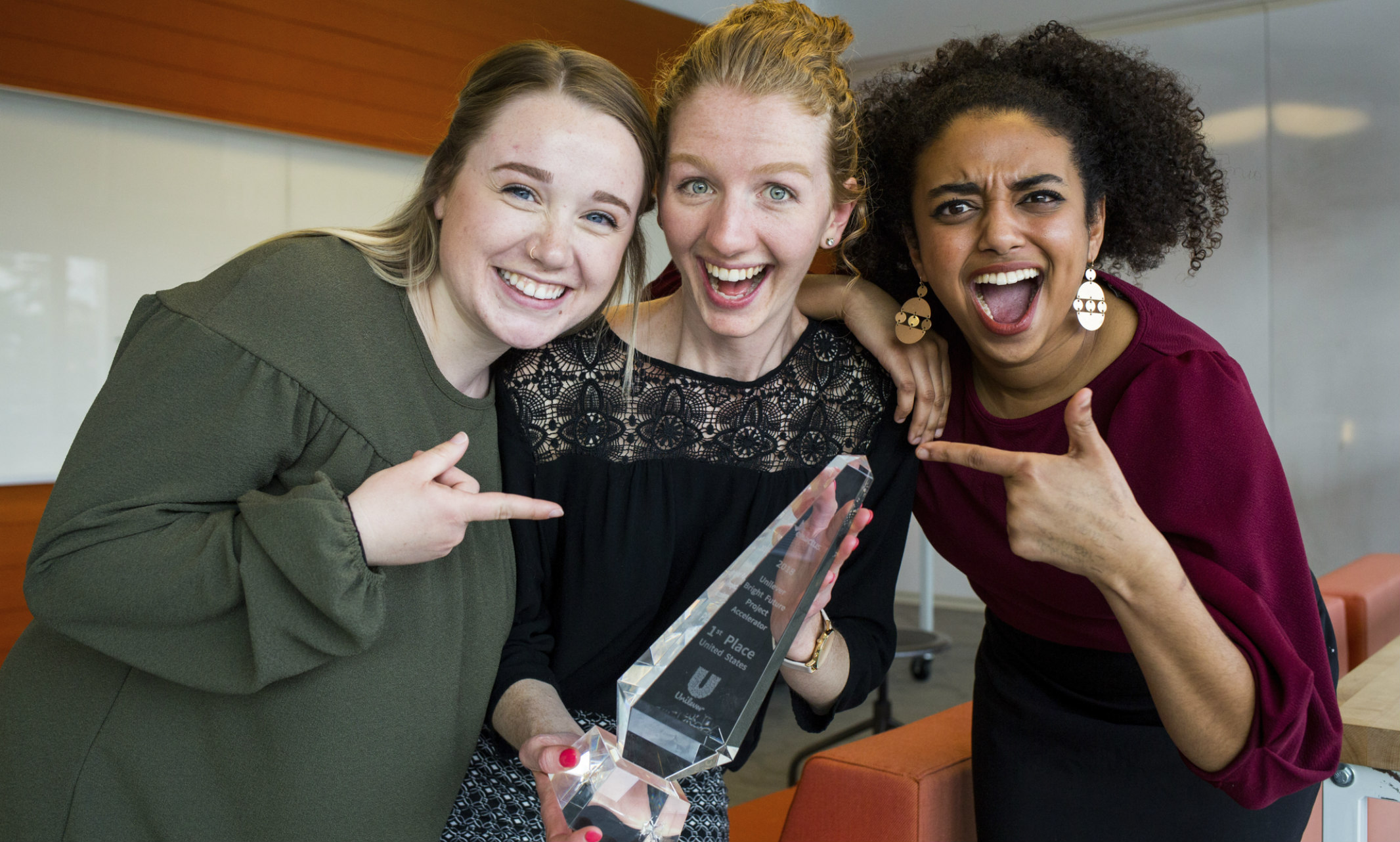
Team of three entrepreneurial leaders travel to London
During spring break, three UMKC Bloch School of Management students studied for hours per day. But the toil was worth the trouble, say Andrea Savage, Salem Habte and Ali Brandolino.
That’s because a global giant, Unilever, has invited them to represent the United States in the Unilever Future Leaders’ League, a business-case competition in London, the company’s world headquarters. Students from 26 countries will present their solutions to two business challenges April 10-12.
“This is incredible validation of our Enactus members and the education they are getting at UMKC. We feel beyond honored to be representing the United States in the upcoming competition.” Ali Brandolino
So just how did these UMKC students earn this coveted spot of being America’s business team?
All three students are members of UMKC Enactus, a group of about 100 students from a wide-ranging group of degree programs who use entrepreneurship to solve community problems. And the UMKC team won first place in the nation in 2018 for the best initiative to combat food waste. The effort is called FeedKC, which takes excess food from local restaurants and university cafeterias and delivers it to area homeless shelters.
So far, 3,300 pounds of food – or 3,300 meals – have fed people through FeedKC.
“Hunger is not a production issue, it’s a distribution issue,” says Savage, project manager of FeedKC. She was also the Bloch School’s Student Entrepreneur of the Year for the same project.
Savage, of Strafford, Missouri, volunteered for a Springfield organization like Harvesters before coming to UMKC, inspiring her to grow FeedKC. She sees lots of potential for more restaurants and businesses to donate, and she and a UMKC School of Computing and Engineering student, Blake Higgins, are working on a mobile app to help make that happen.
UMKC Enactus programs
And FeedKC is just one of half a dozen projects UMKC Enactus is sponsoring. There’s also Smiles and Kuts, a mobile salon in the Kansas City area to give children free haircuts to help boost confidence and self-esteem — for which the Enactus members are seeking out volunteer hair stylists.
And there’s Educate to Elevate, helping a village across the globe in Nigeria. For the past three years, Enactus’ aim has been to provide better infrastructure and basic needs care so the children of the village can have easier access to a better education. In the spring of 2017, the team helped facilitate the building of wells for cleaner water access, and it in 2018 raised funds for restroom facilities. Recently the team has raised raised $6,000 to start construction on school building.
“The goal is for the people to become empowered and the projects to be sustainable on their own,” says Habte, a junior and president of UMKC Enactus.
Enactus sponsors and Bloch School of Management faculty Ben Williams and Erin Blocher will be accompanying the team in the London competition.
Unilever is a corporate sponsor of Enactus USA. The winner of the global competition gets to help Unilever with business projects. Teams are preparing two pitches to solve needs of communities around the globe.
“We always talk about Enactus being an opportunity to implement the things we learn in the classroom, and I think this is incredible validation of our members and the education they are getting at UMKC,” says Brandolino, sophomore and vice president of Enactus. “We feel beyond honored to be representing the United States in the upcoming competition.”
Apr 03, 2019
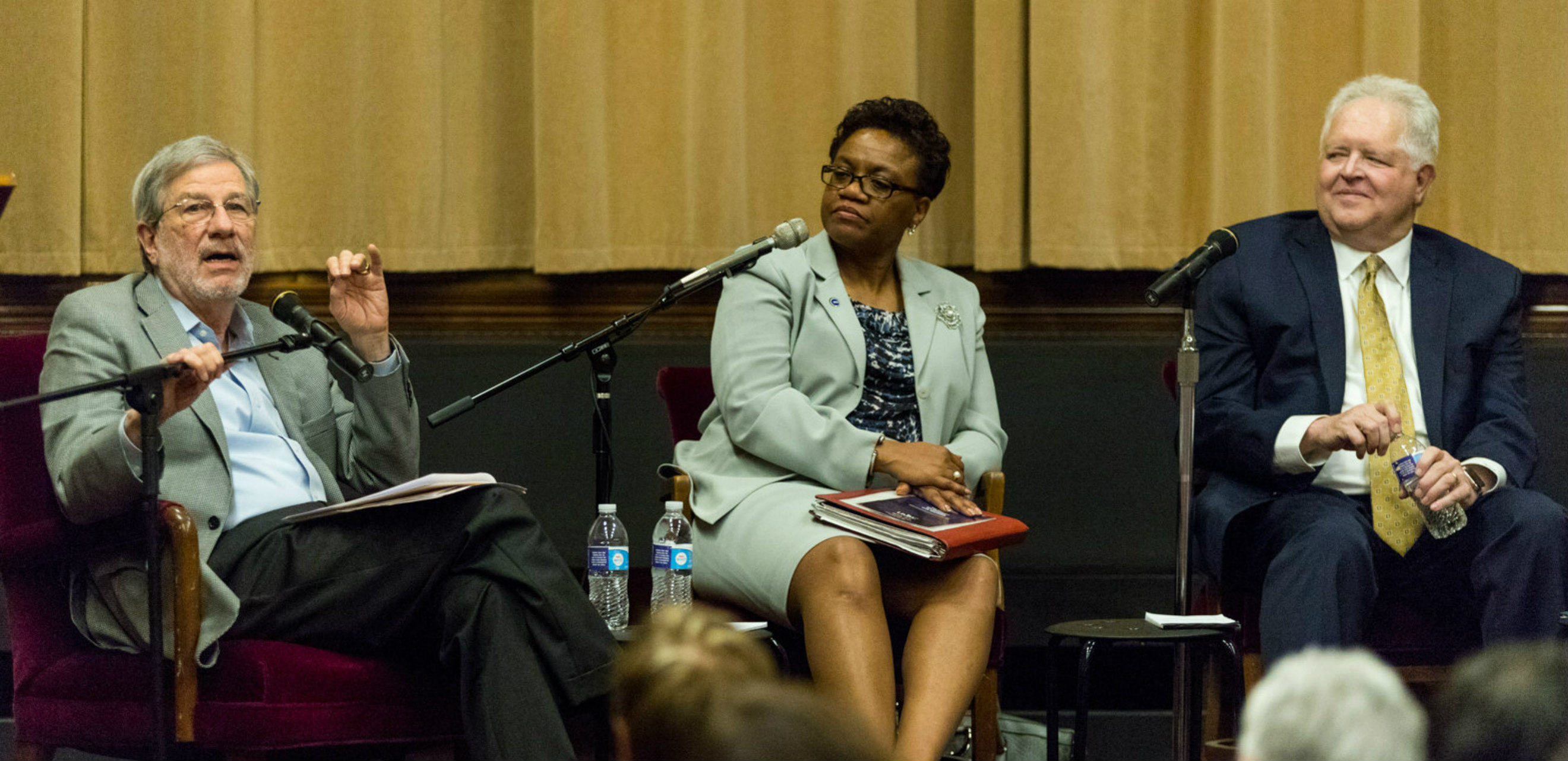
Chancellor's investiture includes evening panel discussion on civil discourse
At colleges across the country, students, faculty and campus leadership are struggling to balance ideals of free speech and respectful dialogue, ideals that at times come into conflict. A UMKC-sponsored panel discussion explored the depth and nuances of the topic.
The panel discussion concluded two days of events marking the formal investiture of Mauli Agrawal, Ph.D., as UMKC chancellor. The discussion was produced by American Public Square at Unity Temple on the Plaza, and sponsored by UMKC. The topic was “The Role and Responsibility of the University to Foster Civil Dialogue.”
Agrawal introduced the program, which featured panelists Kimberly Beatty, Ed.D., chancellor of Metropolitan Community College; Randall Hanna, Ed.D., J.D., dean of Florida State University Panama City; Michael Q. McShane, Ph.D., director of national research for EdChoice; and Margaret Talev, senior White House correspondent for Bloomberg News. The session was moderated by American Public Square founder and UMKC alumnus and faculty member Allan J. Katz, former U.S. Ambassador to Portugal.
“Freedom of speech is one of the most important freedoms we have. How do we interact with each other in a constructive fashion so that the discussion is not divisive?” UMKC Chancellor Mauli Agrawal
Chancellor Mauli Agrawal and his wife, Sue Agrawal, at the event.
The lively discussion that followed demonstrated the complexity of the issue and stimulated thoughtful questions from the audience. Some excerpts:
“The whole point of the college experience is exposure to all sides” of controversial questions. – Beatty
“There are parallels between a university’s role and that of a news organization – to provide information, and to foster an environment where learning can take place and give people an opportunity to challenge their own assumptions.” – Talev
“A lot of universities have become more ideologically homogenous over time.” The problem is less about blatant suppression of opposing views than “a more subtle problem where certain questions just don’t get asked, certain topics don’t get discussed.” – McShane
“Those colleges that are trying to bar certain speakers from campus are only making the problem worse.” – Hanna
“The strategic thing to do with people who are offensive is to ignore them, and encourage others to ignore them.” – Talev
“Poison is determined by the dose. ‘Safetyism’ (protecting people from speech they consider offensive) has gone too far. Rather than think of it as either-or, we need to think of it as a continuum. We want people to be comfortable, but we also have to educate them on how to get along with each other.” – McShane
“We need to be honest about the fact that some people have figured out how to monetize outrage. That works because we click on it.” – McShane
Apr 03, 2019
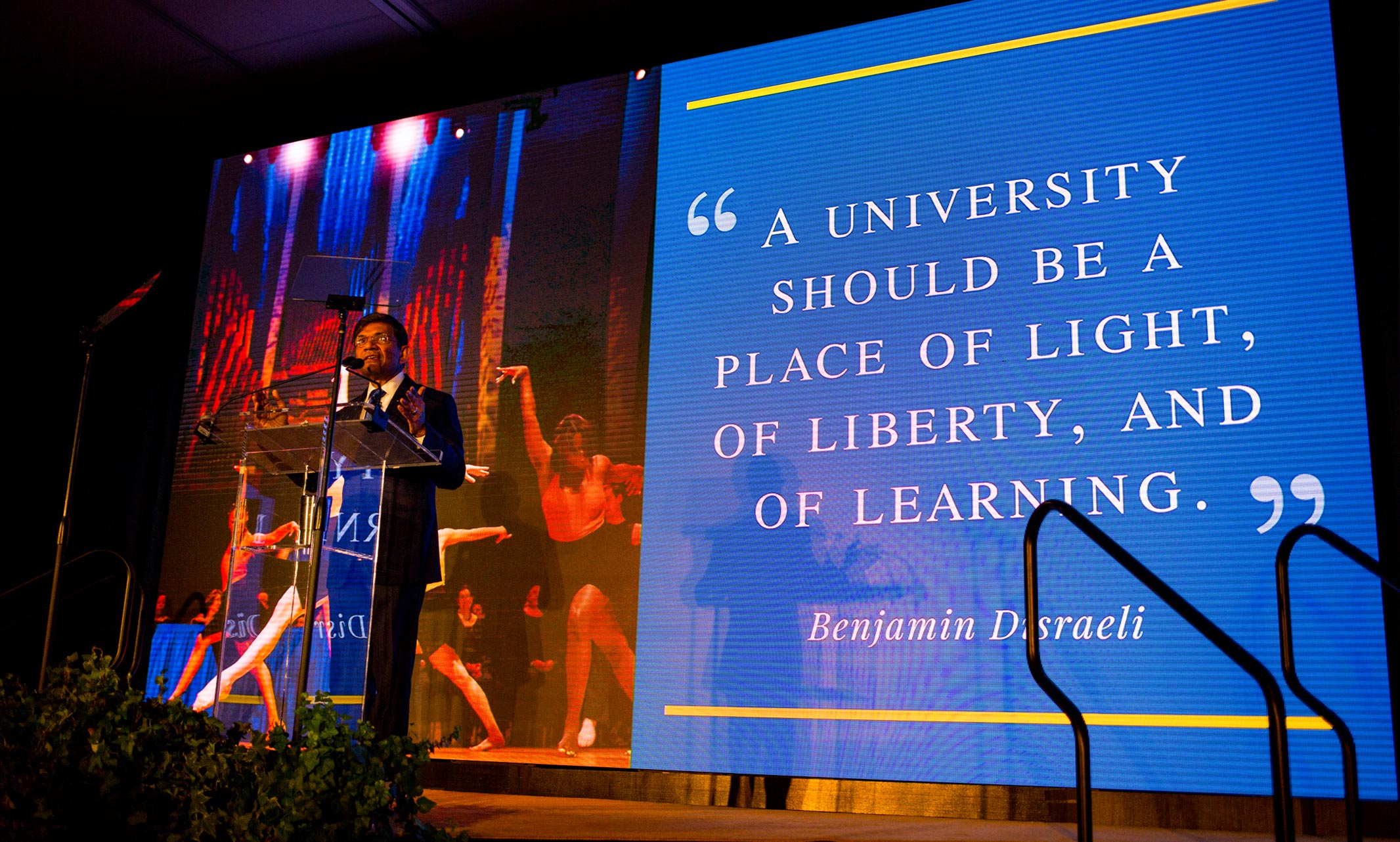
Chancellor introduces 5 new signature initiatives for the university and Kansas City
Students, faculty, staff and the Kansas City community gathered to celebrate the investiture of Mauli Agrawal, Ph.D., as the ninth chancellor of the University of Missouri-Kansas City.
Agrawal took the opportunity at the ceremony — his university inauguration — to share the vision for UMKC that he has been crafting for the past nine months.
“A university should be a place of light, of liberty and of learning,” he said, quoting Benjamin Disraeli. “…That vision calls for all of us to make the commitment to be not only a Place of Light but also become a Community of Excellence.”
So what’s a Community of Excellence? Agrawal referenced a biography about philanthropist Henry Bloch, founder of H & R Block, who has given generously to Kansas City and UMKC.
“’The person who succeeds is the one who does his or her own job, and then some; who is thoughtful to others, and then some; who meets obligations and responsibilities, and then some. That’s the person who steps ahead of the crowd and goes on to great heights,’” Agrawal quoted. “That is the philosophy we must live by to become a Community of Excellence; that is the culture we must grow here at UMKC. The path to excellence is not very complicated — it is as simple as truly living the culture of ‘and then some.’”
Agrawal introduced five signature initiatives — each aligning with the new UMKC Strategic Plan 2018-2028 — that help provide a path to excellence.
Student Success: Roo Strong
Provost Barbara Bichelmeyer and her team have introduced Roo Strong, a new student-success model. It’s a personalized plan for education and support that makes these commitments:
We will meet each student exactly where they are.
We will assess, but not assume or judge.
We will treat each student as a member of our family.
We will engage each student with learning experiences and co-curricular supports to meet their unique needs.
We will provide each student with constant guidance and feedback.
We will help each student take responsibility for their personal progress, their education, their decisions and their futures.
Research: UMKC IDEAS
Agrawal introduced the UMKC Institute for Data Education, Analytics and Science, or IDEAS for short.
The vision of the institute is to position UMKC as the top option for data science education, research and service in the region, building on the university’s strengths in biomedical informatics, big data analytics, image analysis, natural language processing and geospatial analysis.
The coordinator of the new institute is Brent Never, associate professor of public affairs at the Henry W. Bloch School of Management. Never is a “civic hacker” who uses city data to analyze abandoned housing, and was interviewed about his work last year by Lester Holt on NBC Nightly News.
Professional Education: UMKC TalentLink
Individuals enrolled in UMKC TalentLink will not pursue a traditional degree but will work to earn badges, stackable certificates and other new forms of credentials that are evolving in the 21st century. Sarah Morris, the new executive director of informal and continuing education, is leading the development of the initiative.
Healthy Communities: UMKC Health Equity Institute
Jannette Berkley-Patton, associate professor in the UMKC School of Medicine, will lead a new initiative to ensure that individuals and families in the Kansas City area have equal opportunities for improved health and well-being. The Institute will use UMKC research and outreach to identify, quantify and address health care gaps in our neighborhoods.
Berkley-Patton is a national leader in African American health research. One of her noted projects, Taking It to the Pews, was funded with a $3.2 million grant from the National Institute of Mental Health to assess HIV testing. She is the director of the UMKC Community Health Research Group, which supports collaborative community research, and provides doctoral and undergraduate training in community participatory research. She collaborates with networks of churches in her health research in Missouri, Kansas, Alabama and Jamaica.
Building Pride: Mentorship
Several new faculty and staff mentorship and support programs are underway, including “Talk It Up,” focused on career and professional development.
“This commitment to our people is truly foundational,” Agrawal said. “It is the rock on which everything we hope to achieve will be built...More than anything, I want our people to be as proud of themselves, and our university community, as I am proud of all of you. And we have a lot to be proud about. Look around Kansas City.”
Where you see urban education succeeding against long odds, you see Roos.
Where you see the sick being healed and new cures being discovered, you see Roos.
Where you see the innocent being freed from unjust imprisonment, you see Roos.
Where you see communities reducing crime and neighborhoods organizing to improve, you see Roos.
Where you see burgeoning opportunity in engineering, science and technology, you see Roos.
Where you see the arts flourishing and enriching lives, you see Roos.
As you have no doubt been reminded lately, Roos really are everywhere, and they excel everywhere.
Apr 02, 2019
From the Kansas City Business Journal: Mauli Agrawal unveiled five projects as part of his inauguration as chancellor
The University of Missouri-Kansas City chancellor announced two new research institutes and a continuing education program Tuesday as part of a plan to kick-start the school’s growth. Read more
Apr 02, 2019
Dynamic duo in pre-med school preparation means tough love
The heart of UMKC is our campus community. With small class sizes, it’s easy to develop faculty-student mentorship teams. And these rich relationships—our Dynamic Duos—are some of our best success stories.
Sometimes students start to second guess their career aspirations once they get into rigorous coursework. This is especially true for those going into the medical field. But before throwing in the towel, do what Ethan Granger did and explore how mentorship can give you a fresh perspective on your challenges.
Granger is in his third year of the biology program at UMKC. He’s wanted to be a doctor since he was a kid, but he’s been surprised by the incredible focus and hard work his biology degree demands. Nevertheless, his experience is made easier because of the perspective and advice from his mentor, Tammy Welchert, associate teaching professor and director of student affairs and academic advising for the school of biology. The two met at Biology Boot Camp, a summer program for incoming freshman biology students. Curiosity piqued, we recently sat down to listen to them both recall how their mentor/friendship developed.
“Tammy introduced herself at boot camp by saying, ‘Hi, I’m Tammy. I’m like the mom,’” Granger says. “I had moved in the night before and had mock lecture at 8 a.m. I was barely awake – and thinking about food – when she came up to me and said, ‘You’re Ethan Granger!’ When I asked her how she knew, she said, ‘You have a very distinct personality.’”
“It’s very important to me to learn everyone’s name,” says Welchert.
Granger’s mouth drops open.
“That is so not how I took it,” he says. “I thought you’d seen my last mock test and knew I was the one talking in the back during lectures.”
Despite their inauspicious beginning, the two formed a natural connection. Their relationship is relaxed – they are often teasing and laughing – but there is a clear connection of mutual respect.
“For whatever reason, at that boot camp, you all kind of adopted me as ‘Mom,’” Welchert says. “They even called me ‘Mom.’ We've never had that happen in a boot camp before, so that was a little unique. But I think part of that really contributed to you — for whatever reason — feeling like I was someone you could trust. We've talked about a lot of personal things.”
While Welchert is supportive, she is not always a cheerleader.
“I’m at the halfway point to graduation and we had to have a very frank conversation at Crow’s Coffee about four months ago,” Granger says.
“I had to tell him, if you’re going to pursue medical school then you need to focus,” Welchert says.
“I’m one of those people who will spread themselves so thin. Like, you can see the toast under the peanut butter. We were talking about medical school and we had to have a very frank conversation about how I needed to put up and do what I need to do. Most advisors won't have that conversation with you - as frank as it was -but it needs to happen. Someone needed to say to me, ‘You’re not going to make it the way you’re going right now. You need to change or you’re going to be out all this money for nothing.”
Welchert’s wake-up call made a difference.
“I was so stressed out, but she gave me a list of things that I needed to do and I started figuring it out.”
“And you’re in scribe position now!” Welchert says.
Granger acknowledges that this job, which entails updating doctors’ and practitioners’ notes on patients’ charts, has provided a realistic view of the medical profession. And while he’s comfortable with his leadership experience and grades for med school interviews, he wanted more clinical background.
“He had a very glamorous picture of what this career was going to be like,” says Welchert, who recommended him for the position. “So I told him that he need to align his perspective with what it really is.”
Granger says his scribe experience has done that.
“Especially when you have a patient with a stroke and another who’s been in a car crash come in in an hour. It’s shown me a lot of things that need to be fixed about health care. That first-hand experience is something I can definitely talk about in my interviews. ”
Once she knew Granger was willing, Welchert was able to help him get the experience he needed.
“We have a recent alum who is a trainer for the scribe company and I called and said, “Hey look for this application that is going to be coming through. I think this is somebody that'll do a good job.
“It’s been interesting, because Ethan’s and my relationship is something that a lot of students miss,” Welchert says.
While their relationship grew naturally, both agree that students should feel comfortable reaching out to faculty.
“I’ve heard before that students feel as if they’re missing these kinds of close connections. I’m a strong believer that those connections are out there, you just have to go in and work for them. It's on you to foster that connection and make something of that.” Ethan Granger
Welchert agrees that faculty is open to forming mentoring relationships.
“Our faculty will tell you that the most underutilized time that they have is office hours,” she says. “We want students to come in and we want that one-on-one opportunity to interact with the students, but we can't drag you in. There are ways in the School of Biological Sciences that we’re trying to foster that — like with boot camp. We really emphasize building relationships and having the chance to get to know your professor so that you will ask questions.”
Granger says no one has ever given him the impression that they are not available.
“Honestly, I don’t think you’d get hired here if you weren’t there for your students,” Welchert says. She stops and turns to Granger. “Hey, it’s like what you just framed for me!”
“The quotes! Quotes that she tells me three thousand times a day,” says Granger, good-naturedly rolling his eyes.
Welchert does not miss the opportunity to remind him of one of her favorites.
“Never again in your life are you going to be surrounded by so many people who are more invested in your success than you are right here at UMKC.” Tammy Welchert
Granger agrees.
“If it weren’t for Tammy I would have left after the first semester.”
“Really?” she asked incredulously.
“No doubt about it. Yep. Tammy kept me at UMKC.”
Apr 01, 2019
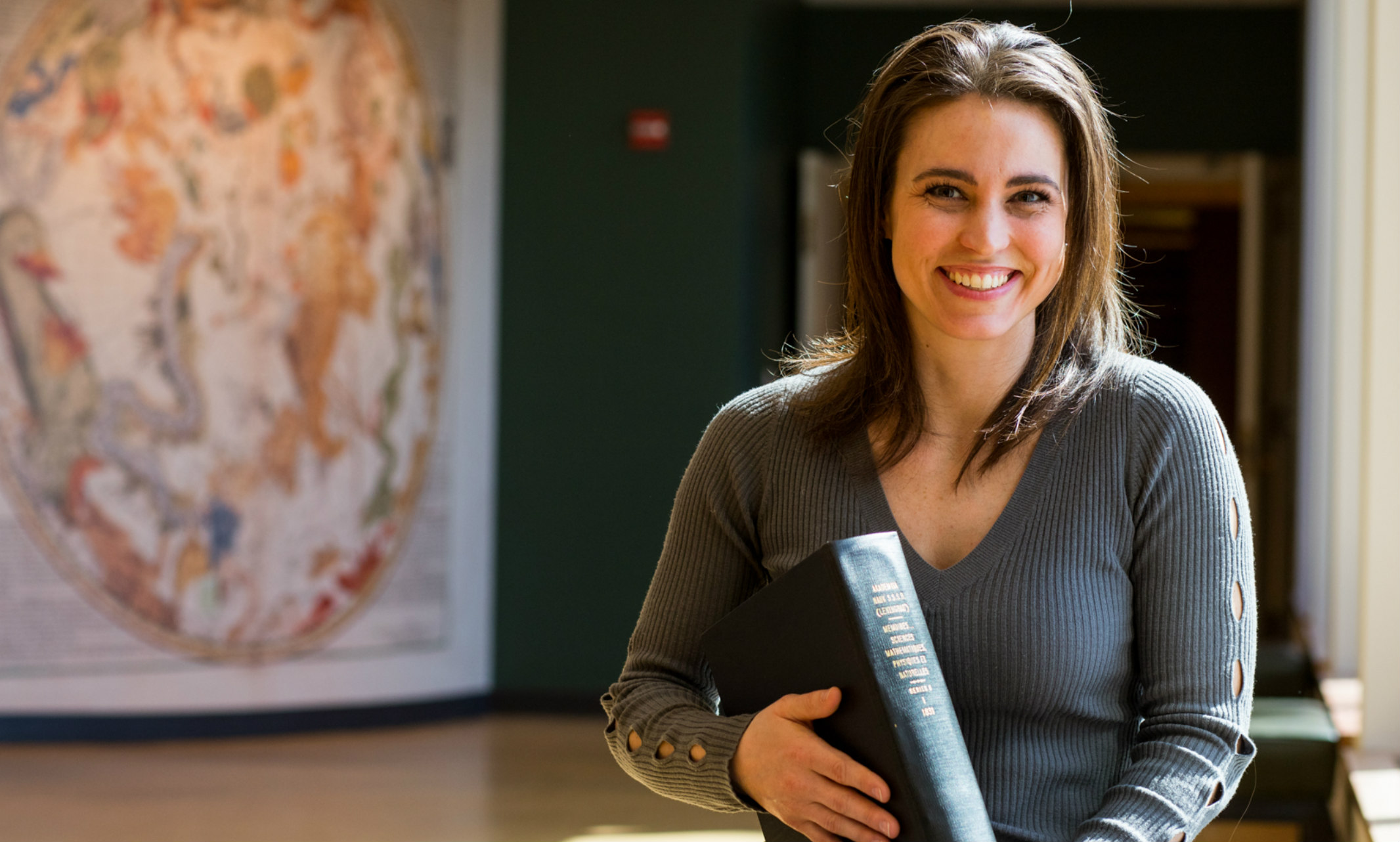
Student translates original 19th century manuscript to support research in mathematics
Whitney White, B.S. mathematics and physics, was excited to find that a historical document that she needed for her undergraduate research was available in its original form at the Linda Hall Library. She was undaunted by the fact that it had never been translated from its original French, even though she did not speak the language.
“I was floored to hold that history in my hands,” White said of the document, which was created in 1831. “And I was over the moon to learn that no translation existed. The history is incredible and being the first person to translate it makes me feel like I have a small part in this history as well.”
Mathematics and physics are White’s passion, and the Divergence Theorem is used in both. Translating the theorem in an unfamiliar language was daunting, but she was undeterred. One of her professors provided a paper that translated common French mathematical terms into English.
“I did not want to misrepresent the original work, so I had to be meticulous and accurate,” White said. “But after completing the translation and connecting the original and modern proofs of the Divergence Theorem, I now better understand it. This more in-depth understanding of the logic of the proof is the greatest personal benefit of completing this project.”
Henrietta Rix Wood, Ph. D., associate teaching professor at the Honors College, notes that this is why undergraduate research is important.
“Undergraduate research is a fun and rewarding way for students to develop important skills, such as posing questions and figuring out how to answer them, testing ideas and applying theories, and sharing their findings.” Henrietta Rix Wood, Ph. D.
She also believes these skills extend beyond the university setting.
“As students contribute to scholarly conversations, they practice the important life skills of problem solving and persevering when things do not go as planned.”
White’s research was published in the latest issue of Lucerna, UMKC’s annual interdisciplinary journal of undergraduate research. Students are welcome to submit research papers written anytime during their academic careers at UMKC.
White says that students interested in being published in Lucerna should pick a novel topic that interests them.
“It‘s important to start your work early, compose multiple drafts and ask for help in tearing them apart,” White says. “If you care about your research, it will show.”
Wood, who is the current Lucerna faculty advisor, encourages students to submit their research.
“This process also is about the thrill of discovery, which Whitney felt when she learned that Linda Hall Library had a historical document that was crucial to her project. I think undergraduate research truly enhances a student’s learning experience.”
For further information, please visit https://honors.umkc.edu/get-involved/lucerna/
Apr 01, 2019
Steven Dial with KSHB interviewed Justice Horn, new SGA president at UMKC
University of Missouri-Kansas City students elected Justice Horn as their Student Government Association president. Watch the news clip
Apr 01, 2019
